




There are many types of noses. Some turn up and some turn down; some are flat, while some are round. Still, all serve the same purpose: that of distinguishing between Limburger and carnations. A few noses have pretty, red blossoms on them---these are almost extinct now, and are highly prized by their owners. The outer olfactory organ of some ladies would resemble the knob of a silver-headed cane if not so profusely dusted with flour. And, when a damsel of color powders her nose the effect is like frost on tar-paper.
It is necessary for some people to carry umbrellas when it rains solely on account of their noses. For, due to the tilt of their nostril coverings, they might drown unless some shelter was provided. There also are noses just the reverse of the above type, being inclined to resemble a parrot's beak. When such a nose is grafted on the map of a certain nationality it is called the dollarmark nose.
A prize fighter's nose is somewhat like a target---it registers every hit. And when one's nose comes in contact with any hard object it often assumes the role of fountain, sending forth a scarlet fluid. This has a pacific effect . on pugilists and other unfortunates.
There are, too, noses of the globe variety. These are sometimes called "pug noses" since they are typical of pug dogs and other pups.
Another kind of nose is that possessed by mosquitoes and other bores. Gossips and people who have less interest in their own than in their neighbors' affairs are the proud possessors of this type of snout. It enables them to pry into the business of others with greater facility.
Much more could be said of this sometimes pointed subject---its hindrances, ailments, advantages and varieties. Suffice it to say, that if many of us would but hold the mirror up to our beaks we would receive severe shocks. Nevertheless, notwithstanding, moreover, hownonever, I have always regarded my nasal organ with reverence. 'How I respect my nose---nobody knows.
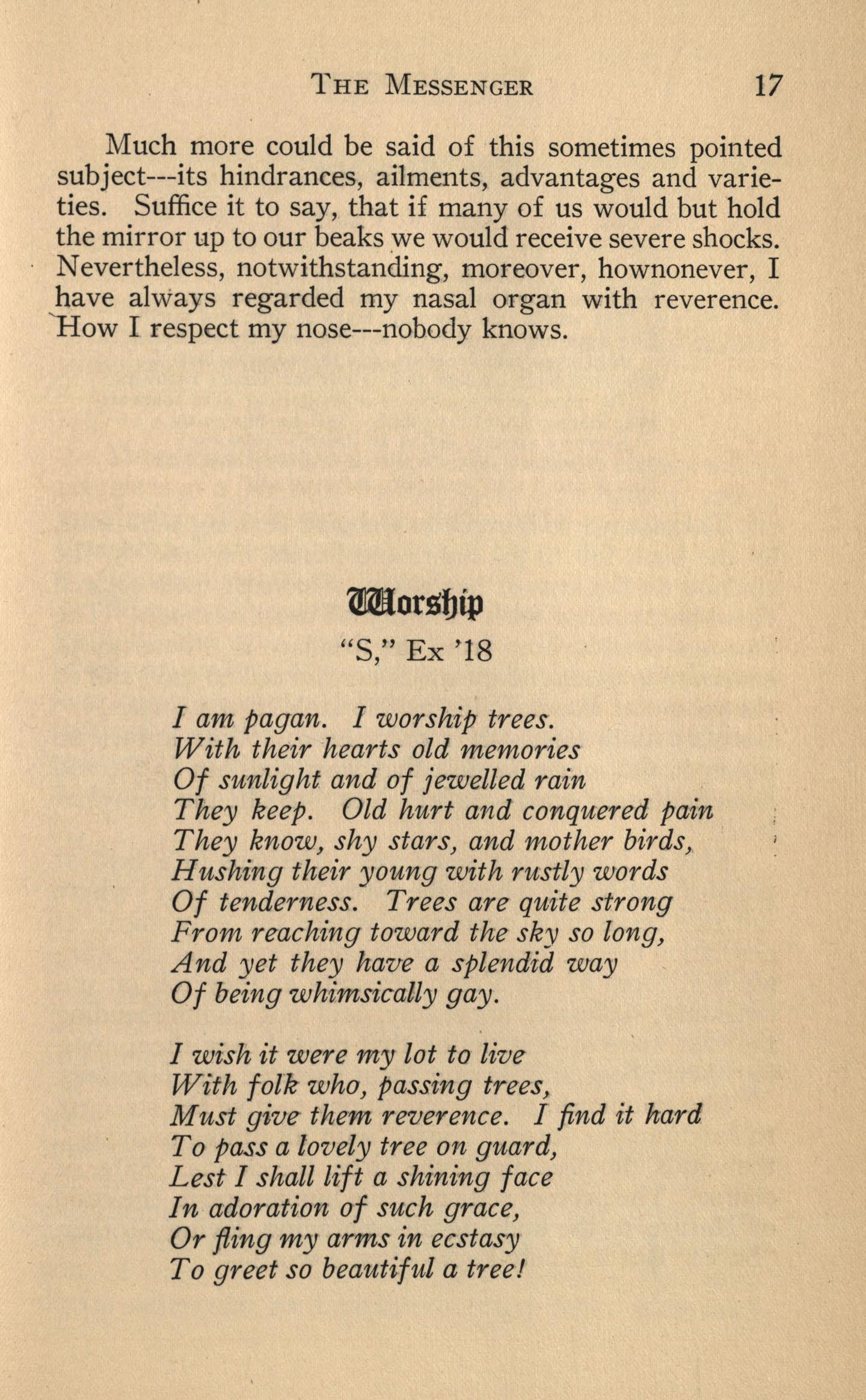
I am pagan. I worship trees. With their hearts old memories Of sunlight and of jewelled rain They keep. Old hurt and conquered pain They know, shy stars, and mother birds, Hushing their young with rustly words Of tenderness. Trees are quite strong From reaching toward the sky so long, And yet they have a splendid way Of being whimsically gay.
I wish it were my lot to live
With folk who, passing trees, Must give- them reverence. I find it hard To pass a lovely tree on guard, Lest I shall lift a shining face In adoration of such grace, Or fling my arms in ecstasy To greet so beautiful a tree!
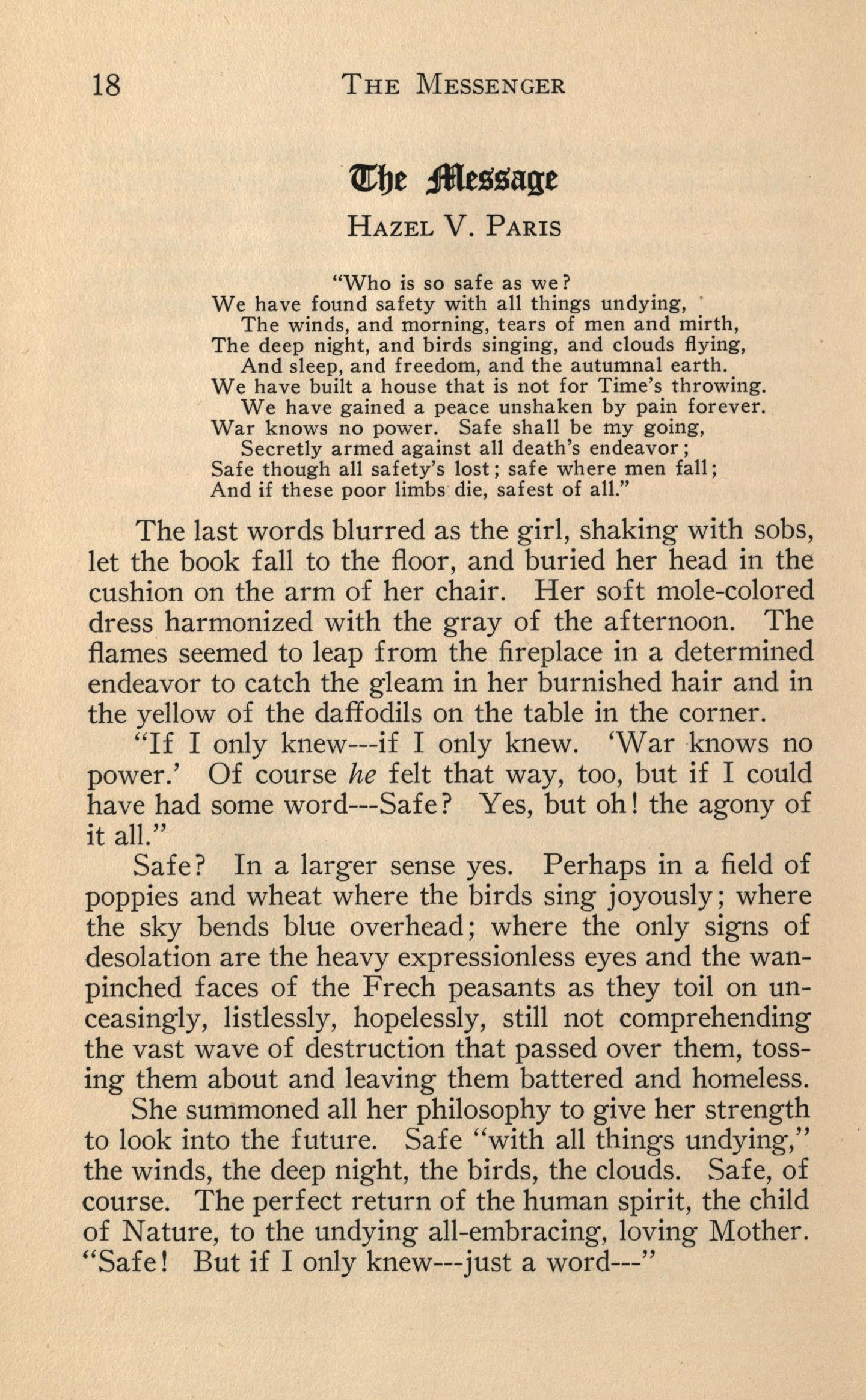
HAZEL V. p ARIS
"Who is so safe as we? We have found safety with all things undying, · The winds, and morning, tears of men and mirth, The deep night, and birds singing, and clouds flying, And sleep , and freedom , and the autumnal earth. We have built a house that is not for Time's throwing. We have gained a peace unshaken by pain forever War knows no po w er. Safe shall be my going , Secretly armed against all death's endeavor; Safe though all safety ' s lost; safe where men fall; And if these poor limbs die, safest of all."
The last words blurred as the girl, shaking with sobs, let the book fall to the floor, and buried her head in the cushion on the arm of her chair. Her so£t mole-colored dress harmonized with the gray of the afternoon. The flames seemed to leap from the fireplace in a determined endeavor to catch the gleam in her burnished hair and in the yellow of the daffodils on the table in the corner.
" If I only knew---if I only knew. 'War knows no power.' Of course he felt that way, too, but if I could have had some word---Saf e? Yes, but oh! the agony of it all."
Sa£e? In a larger sense yes. Perhaps in a field of poppies and wheat where the birds sing joyously; where the sky bends blue overhead; where the only signs of desolation are the heavy expressionless eyes and the wanpinched faces of the Frech peasants as they toil on unceasingly, listlessly, hopelessly, still not comprehending the vast wave of destruction that passed over them, tossing them about and leaving them battered and homeless. She summoned all her philosophy to give her strength to look into the future. Sa£e "with all things undying," the winds, the deep night, the birds, the clouds. Safe, of course. The perfect return of the human spirit, the child of Nature, to the undying all-embracing, loving Mother. "Safe! But if I only knew---just a word---"
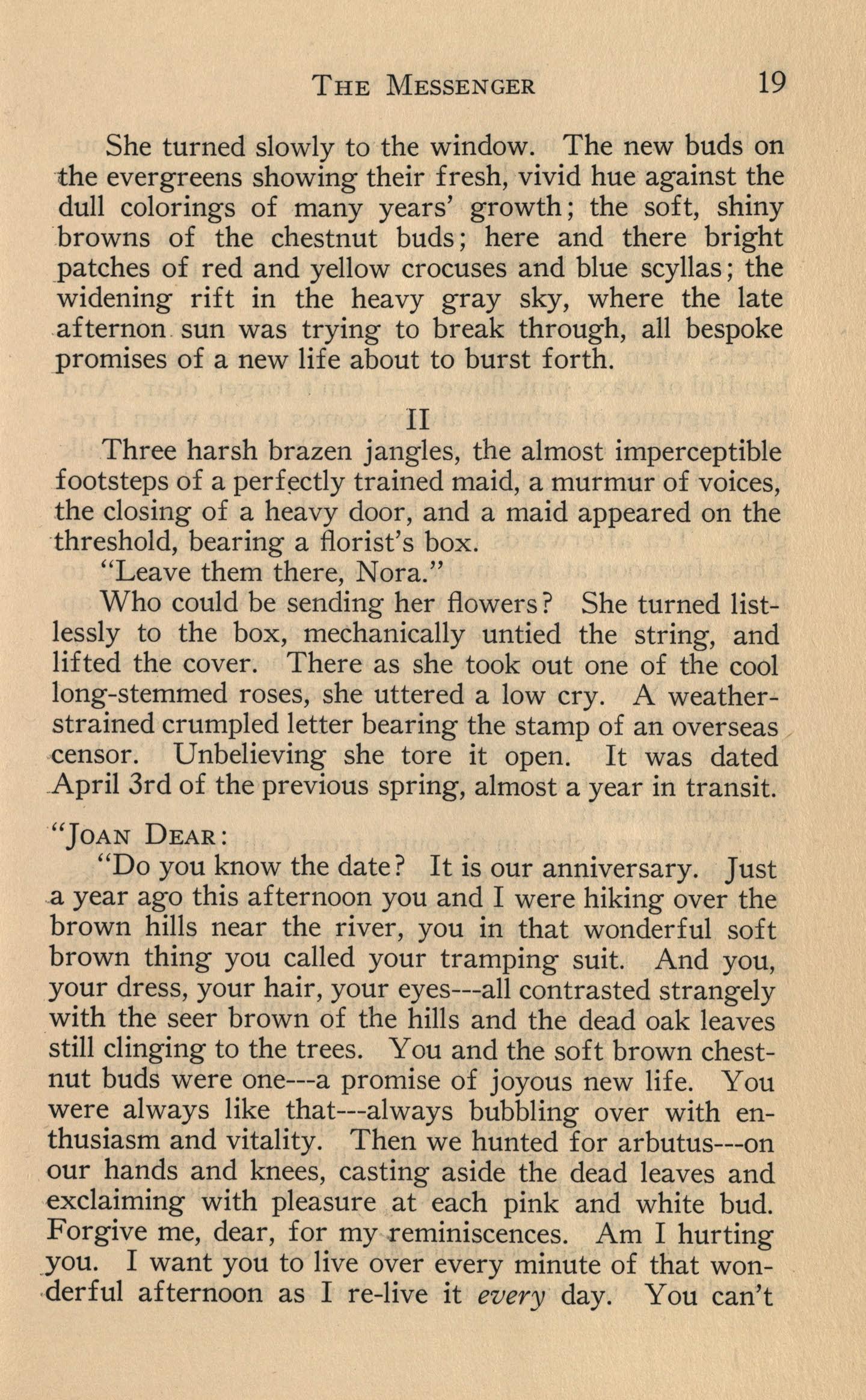
She turned slowly to the window. The new buds on the evergreens showing their fresh, vivid hue against the dull colorings of many years' growth; the soft, shiny browns of the chestnut buds; here and there bright patches of red and yellow crocuses and blue scyllas; the widening rift in the heavy gray sky, where the late afternon . sun was trying to break through, all bespoke promises of a new life about to burst forth.
Three harsh brazen jangles, the almost imperceptible footsteps of a perf ~ctly trained maid, a murmur of voices, the closing of a heavy door, and a maid appeared on the threshold, bearing a florist's box.
"Leave them there, Nora."
Who could be sending her flowers? She turned listlessly to the box, mechanically untied the string, and lifted the cover. There as she took out one of the cool long-stemmed roses, she uttered a low cry. A weatherstrained crumpled letter bearing the stamp of an overseas censor. Unbelieving she tore it open. It was dated .April 3rd of the previous spring, almost a year in transit.
"JOAN DEAR:
"Do you know the date? It is our anniversary. Just .a year ago this afternoon you and I were hiking over the brown hills near the river, you in that wonderful soft brown thing you called your tramping suit. And you, your dress, your hair, your eyes---all contrasted strangely with the seer brown of the hills and the dead oak leaves still clinging to the trees. You and the soft brown chestnut buds were one---a promise of joyous new life. You were always like that---always bubbling over with enthusiasm and vitality. Then we hunted for arbutus---on our hands and knees, casting aside the dead leaves and exclaiming with pleasure at each pink and white bud. Forgive me, dear, for my .reminiscences. Am I hurting _you. I want you to live over every minute of that won,derful afternoon as I re-live it every day. You can't
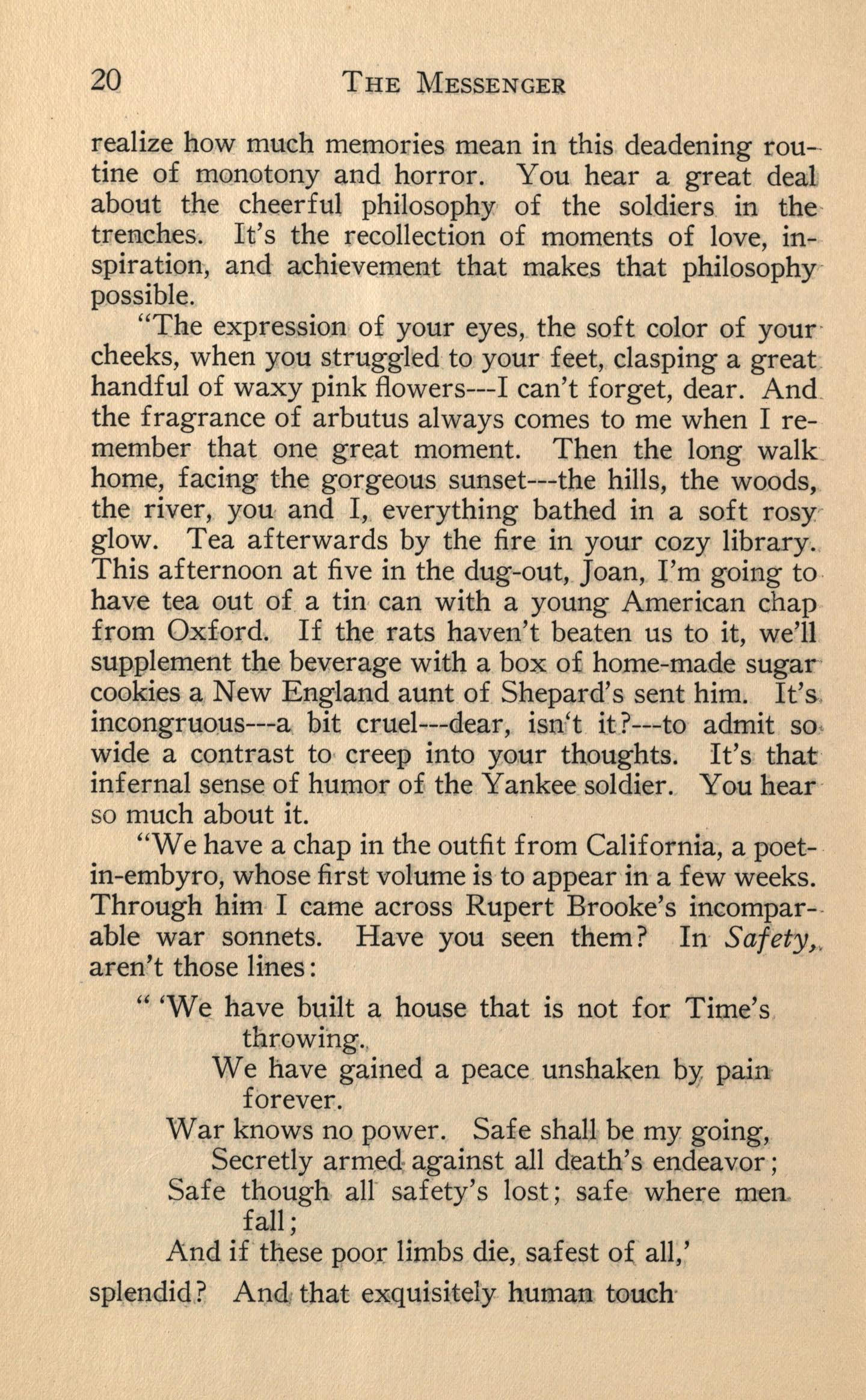
realize how much memories mean in this deadening tau-tine of mcmotony and horror. You hear a great deal about the cheerful philosophy of the soldiers in the treNches. It ' s the recollection of moments of love, inspiration, and achievement that makes that philosophy · possible.
"The expression of your eyes, the soft color of your · cheeks, when you struggled to your feet, clasping a great handful of waxy pink flowers---I can't forget, dear. And the fragrance of arbutus always comes to me when I remember that one great moment. Then the long walk home, facing the gorgeous sunset---the hills, the woods, the river, you • and I, everything bathed in a soft rosy , glow. Tea afterwards by the fire in your cozy library. This afternoon at five in the dug-out, Joan, I'm going to . have tea out of a tin can with a young American chap from Oxford. If the rats haven't beaten us to it, we'll supplement the beverage with a box of home-made sugarcookies a New England aunt of Shepard's sent him. It's . incongruo .us---a , bit cruel---clear, isn't it ?---to admit so wide a contrast to creep into your thoughts. It's that infernal sense of humor of the Yankee soldier. You hear so much about it.
"We have a chap in the outfit from California, a poetin-embyro, whose first volume is to appear in a few weeks. Through him I came across Rupert Brooke's incompar- . able war sonnets. Have you seen them? In Safety, . aren't those lines:
"'We have built a house that is not for Time's throwing ..
We have gained a peace unshaken by, pain forever.
War knows no J?Ower. Safe shall be my going, Secretly armed - against all death's endeavor; Safe though all safety's lost; safe where men. fall; And if these poor limbs die, safest o~ all,' splendid? AncLthat exquisitely human touch-
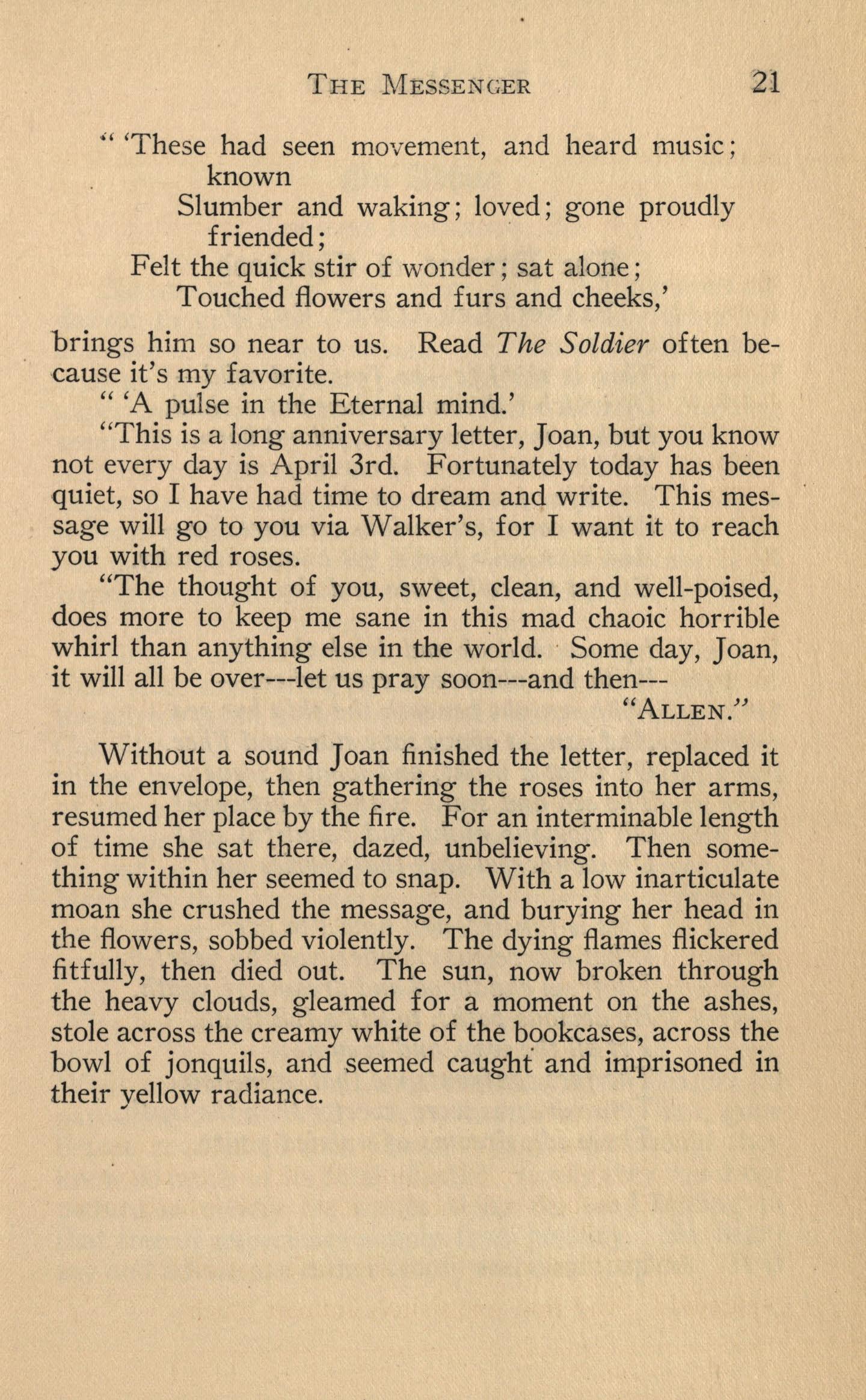
" ' These had seen movement, and heard music; known Slumber and waking; loved; gone proudly friended;
Felt the quick stir of wonder; sat alone; Touched flowers and furs and cheeks,'
brings him so near to us. Read The Soldier often be•cause it's my favorite.
"'A pulse in the Eternal mind.'
" This is a long anniversary letter, Joan, but you know not every day is April 3rd. Fortunately today has been quiet, so I have had time to dream and write. This message will go to you via Walker's, for I want it to reach you with red roses.
"The thought of you, sweet, clean, and well-poised, does more to keep me sane in this mad chaoic horrible whirl than anything else in the world. · Some day, Joan, it will all be over---let us pray soon---and then--"ALLEN."
Without a sound Joan finished the letter, replaced it in the envelope, then gathering the roses into her arms, resumed her place by the fire. For an interminable length of time she sat there, dazed, unbelieving. Then something within her seemed to snap. With a low inarticulate moan she crushed the message, and burying her head in the flowers, sobbed violently. The dying flames flickered fitfully, then died out. The sun, now broken through the heavy clouds, gleamed for a moment on the ashes, stole across the creamy white of the bookcases, across the bowl of jonquils, and seemed caught and imprisoned in their yellow radiance.
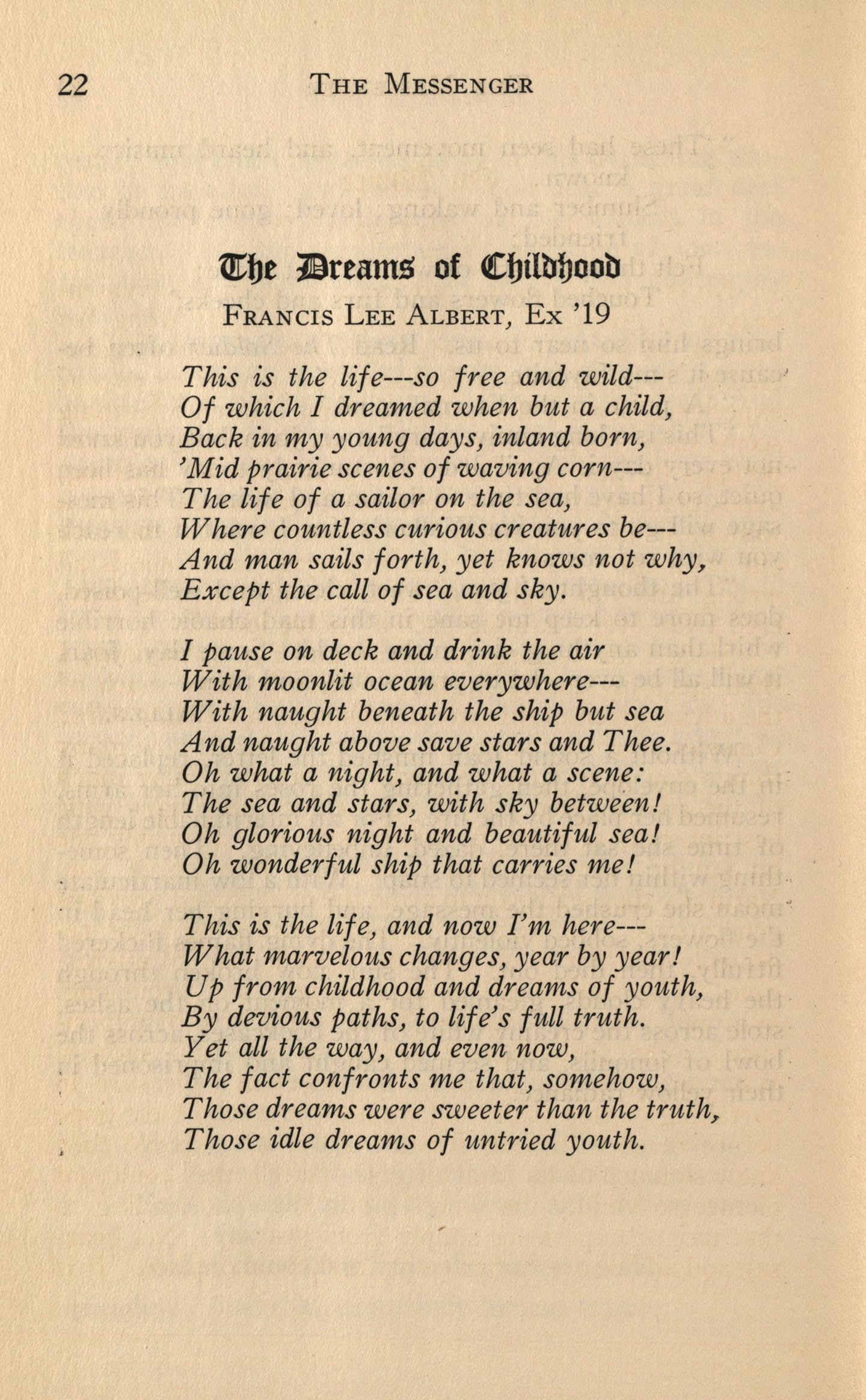
~IJt
FRANCIS LEE ALBERT, Ex '19
This is the life---so free and wild---
Of which I dreamed when but a child, Back in my young days, inland born, 'Mid prairie scenes of waving corn---
The life of a sailor on the sea, Where countless curious creatures be---
And man sails forth, yet knows not why~
Except the call of sea and sky.
I pause on deck and drink the air
With moonlit ocean everywhere---
With naught beneath the ship but sea And naught above save stars and Thee.
Oh what a night, and what a scene:
The sea and stars, with sky between!
Oh glorious night and beautiful sea!
Oh wonderful ship that carries me!
This is the life, and now I'm here--What marvelous changes, year by year!
V p from childhood and dreams of youth, By devious paths, to life's full truth. Yet all the way, and even now, The fact confronts me that, somehow, Those dreams were sweeter than the truth~ Those idle dreams of untried youth.
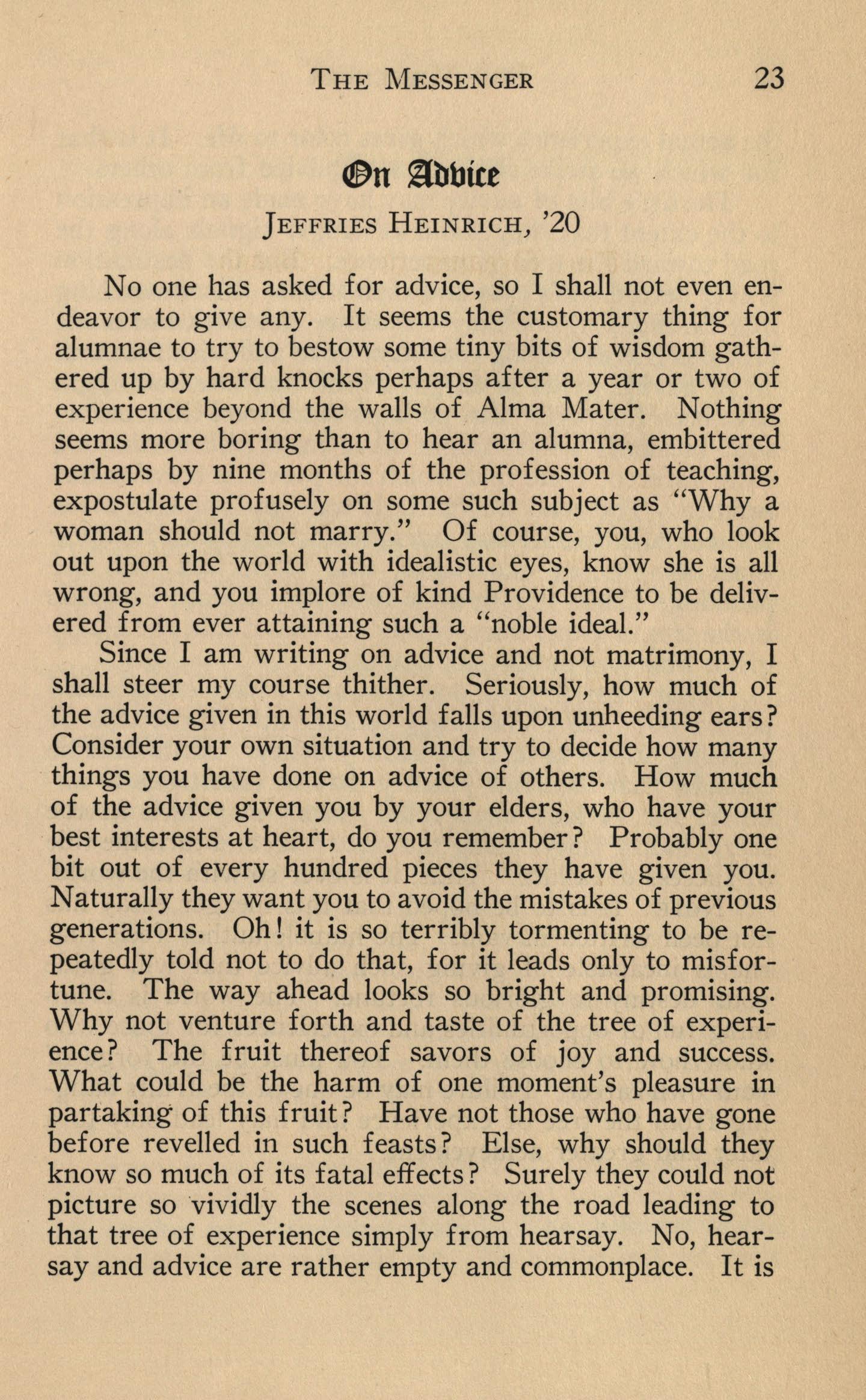
No one has asked for advice, so I shall not even endeavor to give any. It seems the customary thing for alumnae to try to bestow some tiny bits of wisdom gathered up by hard knocks perhaps after a year or two of experience beyond the walls of Alma Mater. Nothing seems more boring than to hear an alumna, embittered perhaps by nine months of the profession of teaching, expostulate profusely on some such subject as "Why a woman should not marry." Of course, you, who look out upon the world with idealistic eyes, know she is all wrong, and you implore of kind Providence to be delivered from ever attaining such a "noble ideal." Since I am writing on advice and not matrimony, I shall steer my course thither. Seriously, how much of the advice given in this world falls upon unheeding ears? Consider your own situation and try to decide how many things you have done on advice of others. How much of the advice given you by your elders, who have your best interests at heart, do you remember? Probably one bit out of every hundred pieces they have given you. Naturally they want you to avoid the mistakes of previous generations. Oh! it is so terribly tormenting to be repeatedly told not to do that, for it leads only to misfortune. The way ahead looks so bright and promising. Why not venture forth and taste of the tree of experience? The fruit thereof savors of joy and success. What could be the harm of one moment's pleasure in partaking of this fruit? Have not those who have gone before revelled in such feasts? Else, why should they know so much of its fatal effects? Surely they could not picture so vividly the scenes along the road leading to that tree of experience simply from hearsay. No, hearsay and advice are rather empty and commonplace. It is
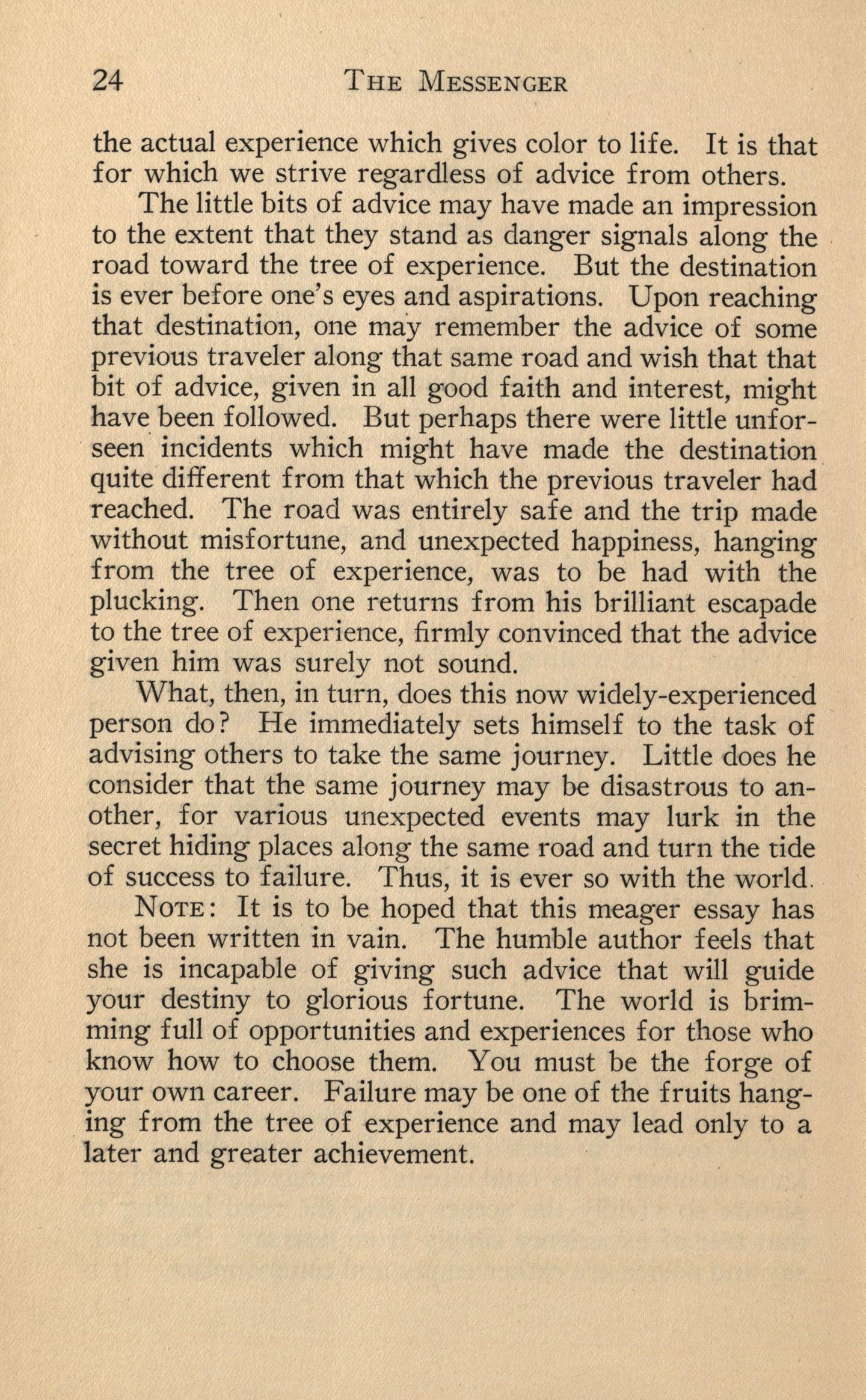
the actual experience which gives color to life. It is that for which we strive regardless of advice from others. The little bits of advice may have made an impression to the extent that they stand as danger signals along the . road toward the tree of experience. But the destination is ever before one's eyes and aspirations. Upon reaching that destination, one may remember the advice of some previous traveler along that same road and wish that that bit of advice, given in all good faith and interest, might have been followed. But perhaps there were little unfor. seen · incidents which might have made the destination quite ·different from that which the previous traveler had reached. The road was entirely safe and the trip made without misfortune, and unexpected happiness, hanging from the tree of experience, was to be had with the plucking. Then one returns from his brilliant escapade to the tree of experience, firmly convinced that the advice given him was surely not sound. What, then, in turn, does this now widely-experienced person do? He immediately sets himself to the task of advising others to take the same journey. Little does he consider that the same journey may be disastrous to another, for various unexpected events may lurk in the secret hiding places along the same road and turn the tide of success to failure. Thus, it is ever so with the world .
NOTE: It is to be hoped that this meager essay has not been written in vain. The humble author feels that she is incapable of giving such advice that will guide your destiny to glorious fortune. The world is brimming full of opportunities and experiences for those who know how to choose them. You must be the forge of your own career. Failure may be one of the fruits hanging from the tree of experience and may lead only to a later and greater achievement.
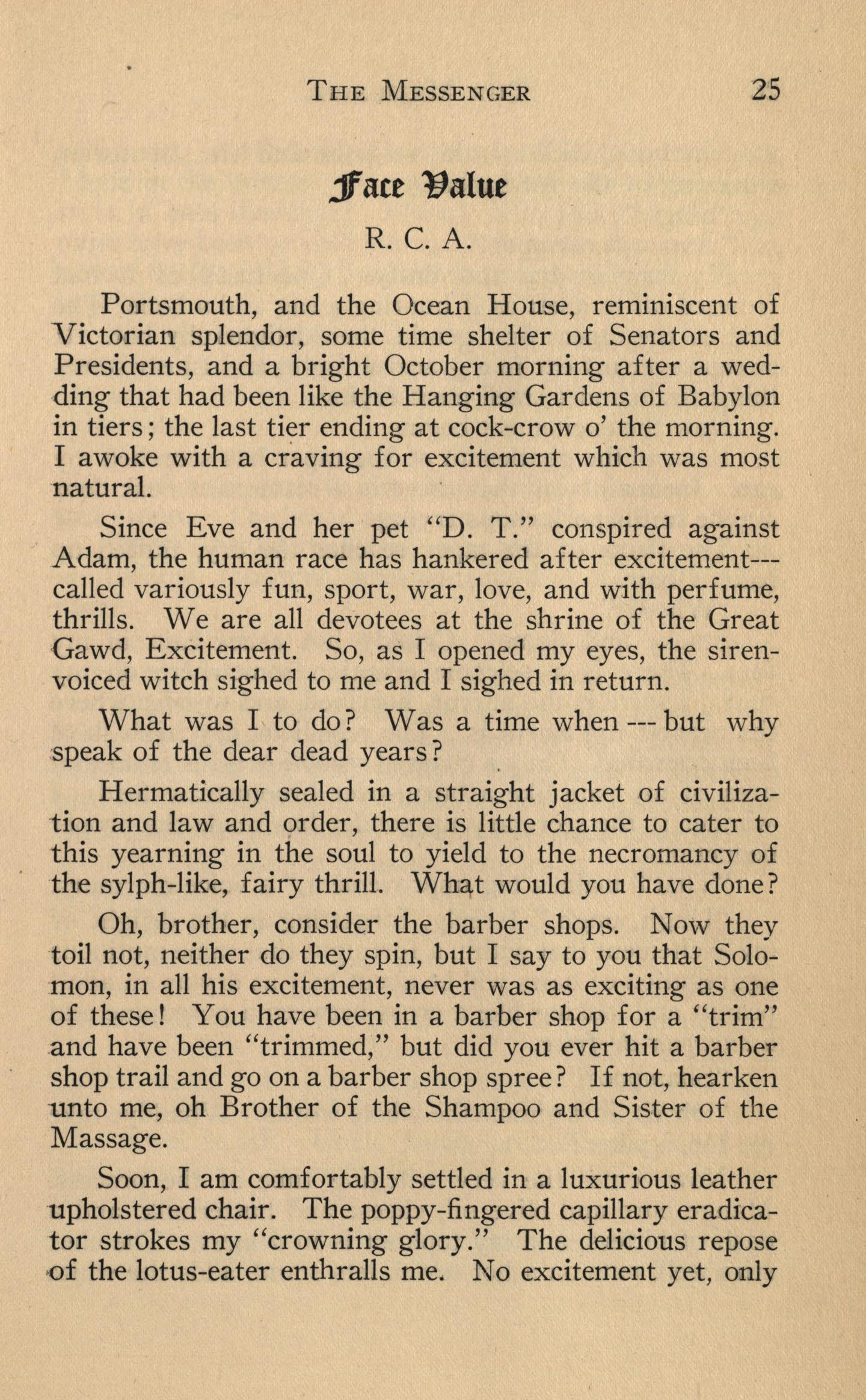
Portsmouth, and the Ocean House, reminiscent of Victorian splendor, some time shelter of Senators and Presidents, and a bright October morning after a wedding that had been like the Hanging Gardens of Babylon in tiers; the last tier ending at cock-crow o' the morning. I awoke with a craving for excitement which was most natural.
Since Eve and her pet "D. T." conspired against Adam, the human race has hankered after excitement--called variously fun, sport, war, love, and with perfume, thrills. We are all devotees at the shrine of the Great Gawd, Excitement. So, as I opened my eyes, the sirenvoiced witch sighed to me and I sighed in return.
What was I to do? Was a time when but why ·speak of the dear dead years?
Hermatically sealed in a straight jacket of civilization and law and order, there is little chance to cater to this yearning in the soul to yield to the necromancy of the sylph-like, fairy thrill. Whc1,twould you have done?
Oh, brother, consider the barber shops. Now they toil not, neither do they spin, but I say to you that Solomon, in all his excitement, never was as exciting as one of these! You have been in a barber shop for a "trim" and have been "trimmed," but did you ever hit a barber shop trail and go on a barber shop spree? If not, hearken unto me, oh Brother of the Shampoo and Sister of the Massage.
Soon, I am comfortably settled in a luxurious leather ·upholstered chair. The poppy-fingered capillary eradicator strokes my "crowning glory." The delicious repose ,of the lotus-eater enthralls me, No excitement yet, only
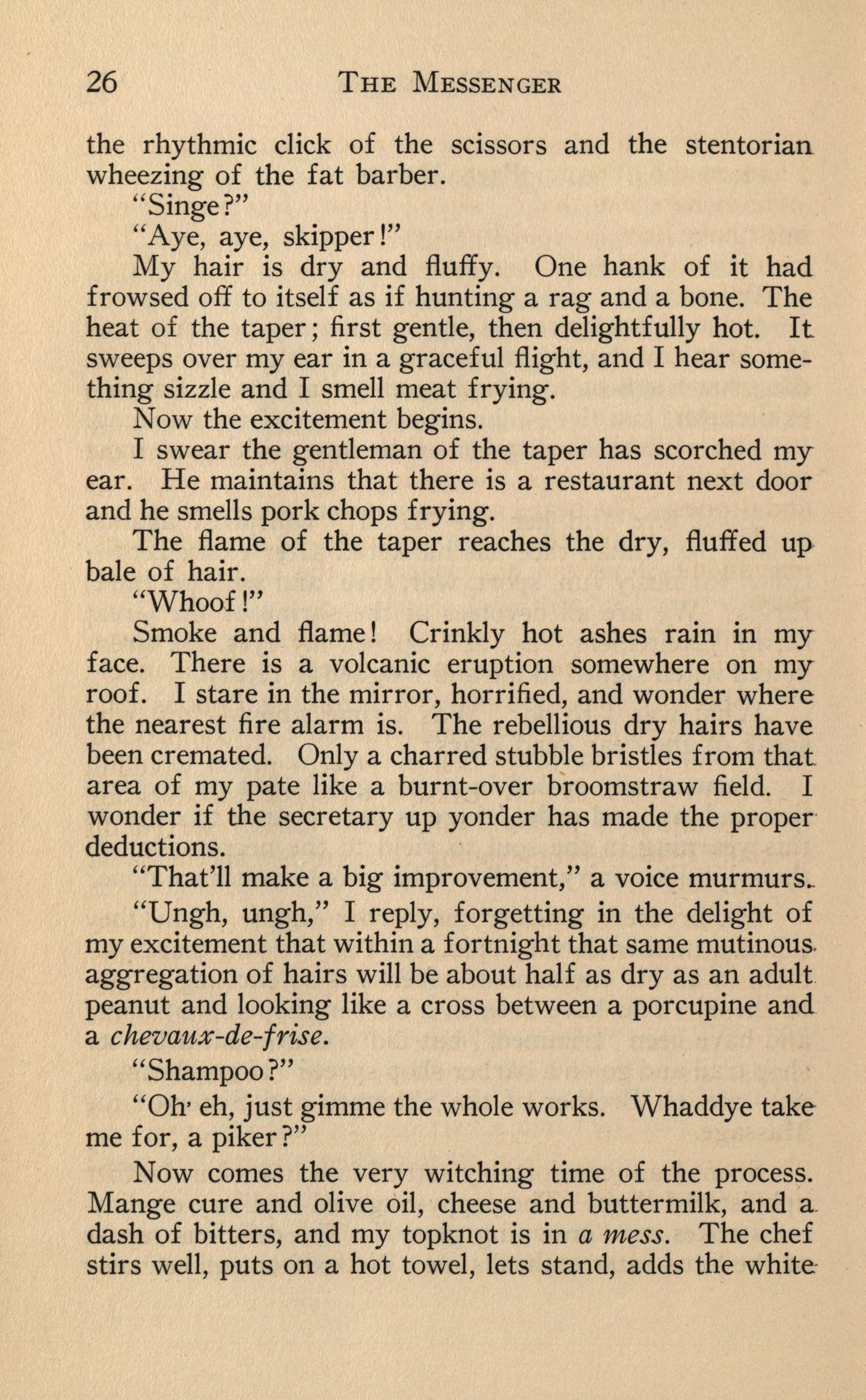
the rhythmic click of the scissors and the stentorian wheezing of the fat barber.
" Singe?"
" Aye, aye, skipper!"
My hair is dry and fluffy. One hank of it had frowsed off to itself as if hunting a rag and a bone. The heat of the taper; first gentle, then delightfully hot. It sweeps over my ear in a graceful flight, and I hear something sizzle and I smell meat frying. Now the excitement begins.
I swear the gentleman of the taper has scorched my ear. He maintains that there is a restaurant next door and he smells pork chops frying.
The flame of the taper reaches the dry, fluffed up . bale of hair.
"Whoo£!"
Smoke and flame! Crinkly hot ashes rain in my face. There is a volcanic eruption somewhere on my roof. I stare in the mirror, horrified, and wonder where the nearest fire alarm is. The rebellious dry hairs have been cremated. Only a charred stubble bristles from that area of my pate like a burnt-over broomstraw field. I wonder if the secretary up yonder has made the proper · deductions.
"That'll make a big improvement," a voice murmurs .. "Ungh, ungh," I reply, forgetting in the delight of my excitement that within a fortnight that same mutinous . aggregation of hairs will be about half as dry as an adult peanut and looking like a cross between a porcupine and a chevaux-de-frise.
"Shampoo?"
"Oh· eh, just gimme the whole works. Whaddye takeme for, a piker?"
Now comes the very witching time of the process. Mange cure and olive oil, cheese and buttermilk, and a . dash of bitters, and my topknot is in a mess. The chef stirs well, puts on a hot towel, lets stand, adds the white:
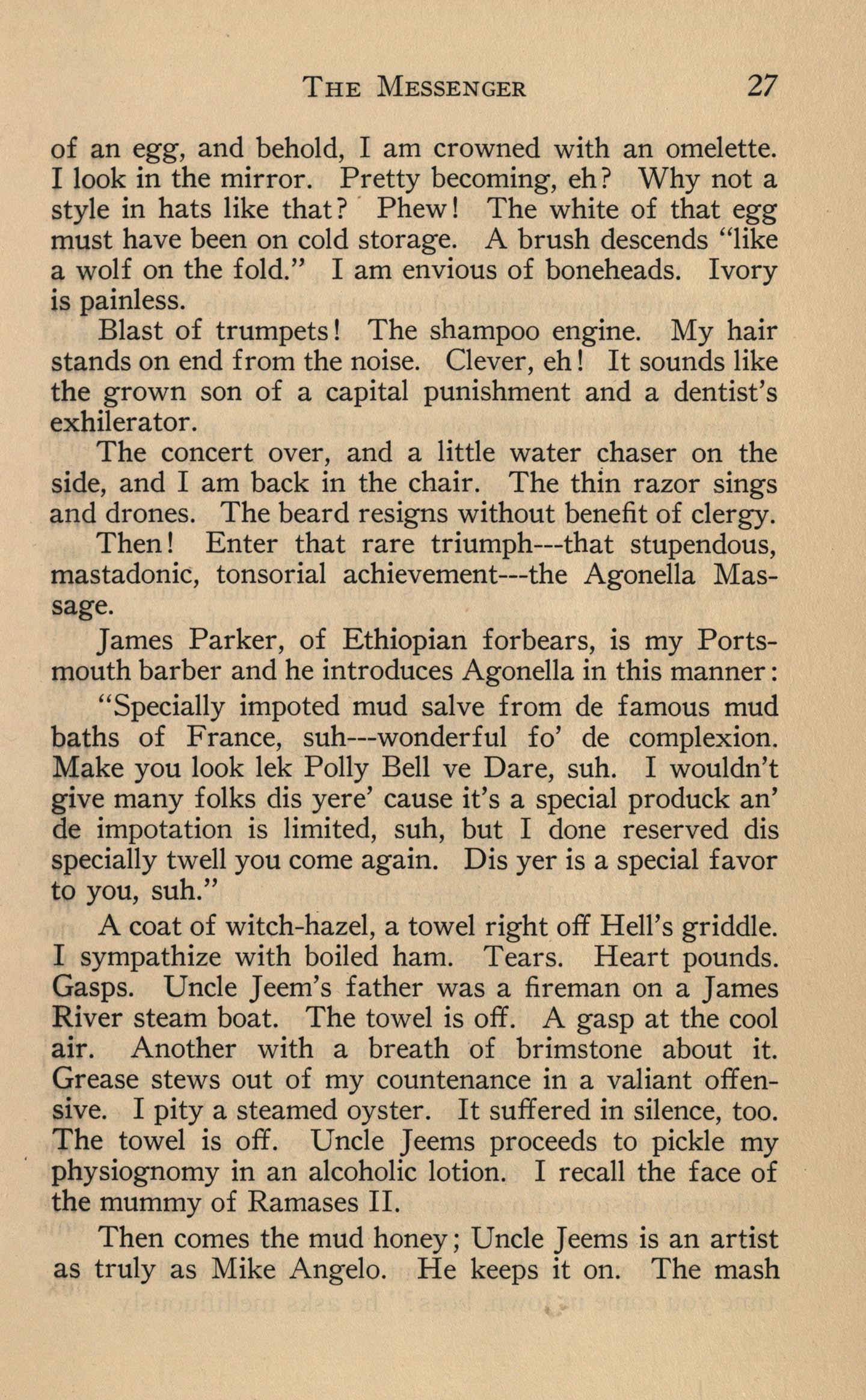
of an egg, and behold, I am crowned with an omelette. I look in the mirror. Pretty becoming, eh? Why not a style in hats like that? · Phew! The white of that egg must have been on cold storage. A brush descends "like a wolf on the fold." I am envious of boneheads. Ivory is painless.
Blast of trumpets! The shampoo engine. My hair stands on end from the noise. Clever, eh! It sounds like the grown son of a capital punishment and a dentist's exhilerator.
The concert over, and a little water chaser on the side, and I am back in the chair. The thin razor sings and drones. The beard resigns without benefit of clergy.
Then! Enter that rare triumph---that stupendous, mastadonic, tonsorial achievement---the Agonella Massage.
James Parker, of Ethiopian forbears, is my Portsmouth barber and he introduces Agonella in this manner :
"Specially impoted mud salve from de famous mud baths of France, suh---wonderful fo' de complexion. Make you look lek Polly Bell ve Dare, suh. I wouldn't give many folks dis yere' cause it's a special produck an' de impotation is limited, suh, but I done reserved dis specially twell you come again. Dis yer is a special favor to you, suh."
A coat of witch-hazel, a towel right off Hell's griddle. I sympathize with boiled ham. Tears. Heart pounds. Gasps. Uncle Jeem's father was a fireman on a James River steam boat. The towel is off. A gasp at the cool air. Another with a breath of brimstone about it. Grease stews out of my countenance in a valiant offensive. I pity a steamed oyster. It suffered in silence, too. The towel is off. Uncle Jeems proceeds to pickle my physiognomy in an alcoholic lotion. I recall the face of the mummy of Ramases II.
Then comes the mud honey; Uncle Jeems is an artist as truly as Mike Angelo. He keeps it on. The mash
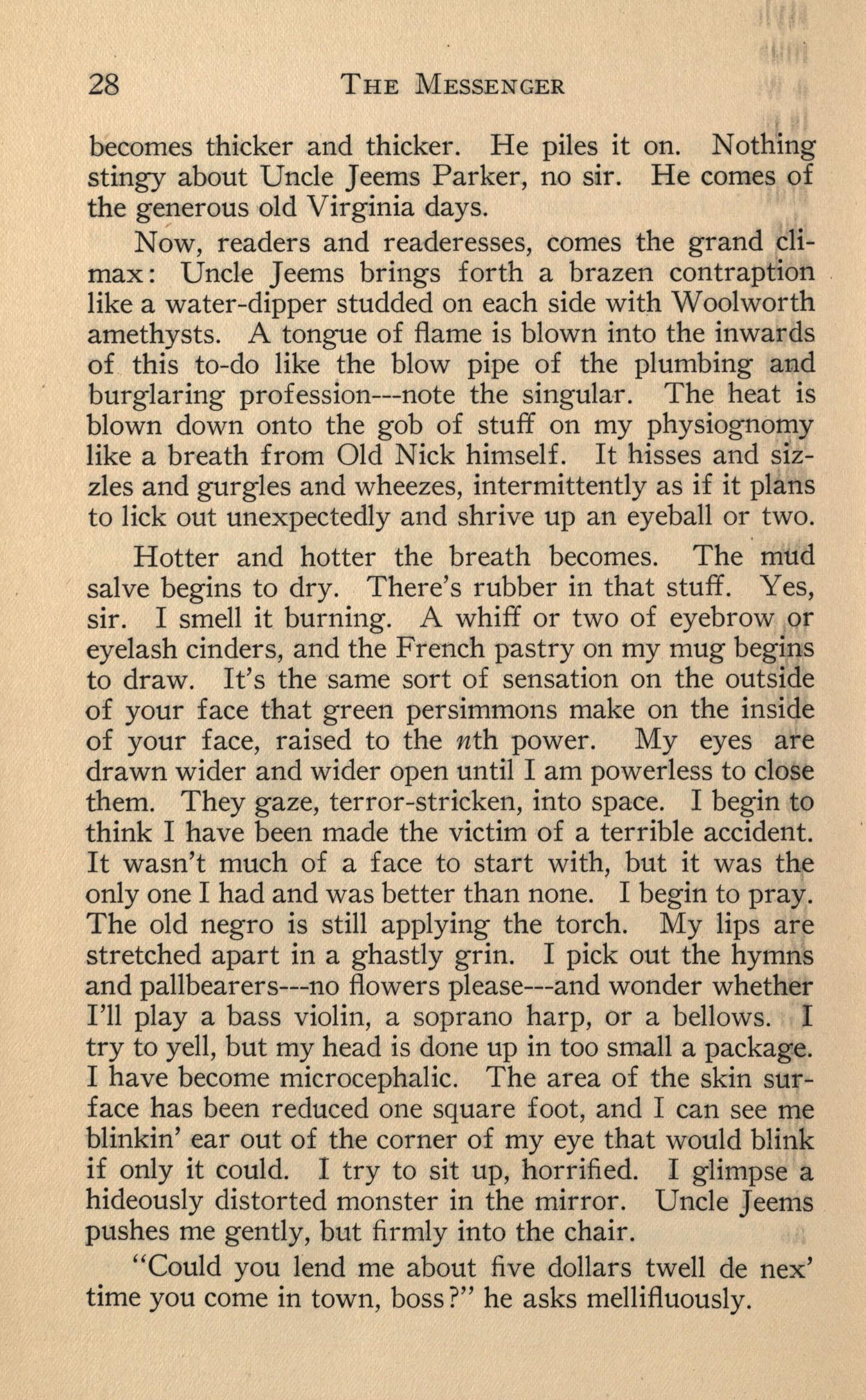
becomes thicker and thicker. He piles it on. Nothing stingy about Uncle Jeems Parker, no sir. He comes of the generous old Virginia days.
N~w, readers and readeresses, comes the grand climax: Uncle Jeems brings forth a brazen contraption . like a water-dipper studded on each side with Woolworth amethysts. A tongue of flame is blown into the inwards of this to-do like the blow pipe of the plumbing and burglaring prof ession---note the singular. The heat is blown down onto the gob of stuff on my physiognomy like a breath from Old Nick himself. It hisses and sizzles and gurgles and wheezes, intermittently as if it plans to lick out unexpectedly and shrive up an eyeball or two. Hotter and hotter the breath becomes. The ·mud salve begins to dry. There's rubber in that stuff. Yes, sir. I smell it burning. A whiff or two of eyebrow or eyelash cinders, and the French pastry on my mug begins to draw. It's the same sort of sensation on the outside of your face that green persimmons make on the inside of your face, raised to the nth power. My eyes are drawn wider and wider open until I am powerless to close them. They gaze, terror-stricken, into space. I begin to think I have been made the victim of a terrible accident. It wasn't much of a face to start with, but it was the only one I had and was better than none. I begin to pray. The old negro is still applying the torch. My lips are stretched apart in a ghastly grin. I pick out the hymns and pallbearers---no flowers please---and wonder whether I'll play a bass violin, a soprano harp, or a bellows. I try to yell, but my head is done up in too small a package. I have become microcephalic. The area of the skin surface has been reduced one square foot, and I can see me blinkin' ear out of the corner of my eye that would blink if only it could. I try to sit up, horrified. I glimpse a hideously distorted monster in the mirror . Uncle Jeems pushes me gently, but firmly into the chair.
"Could you lend me about five dollars twell de nex' time you come in town, boss?" he asks mellifluously.
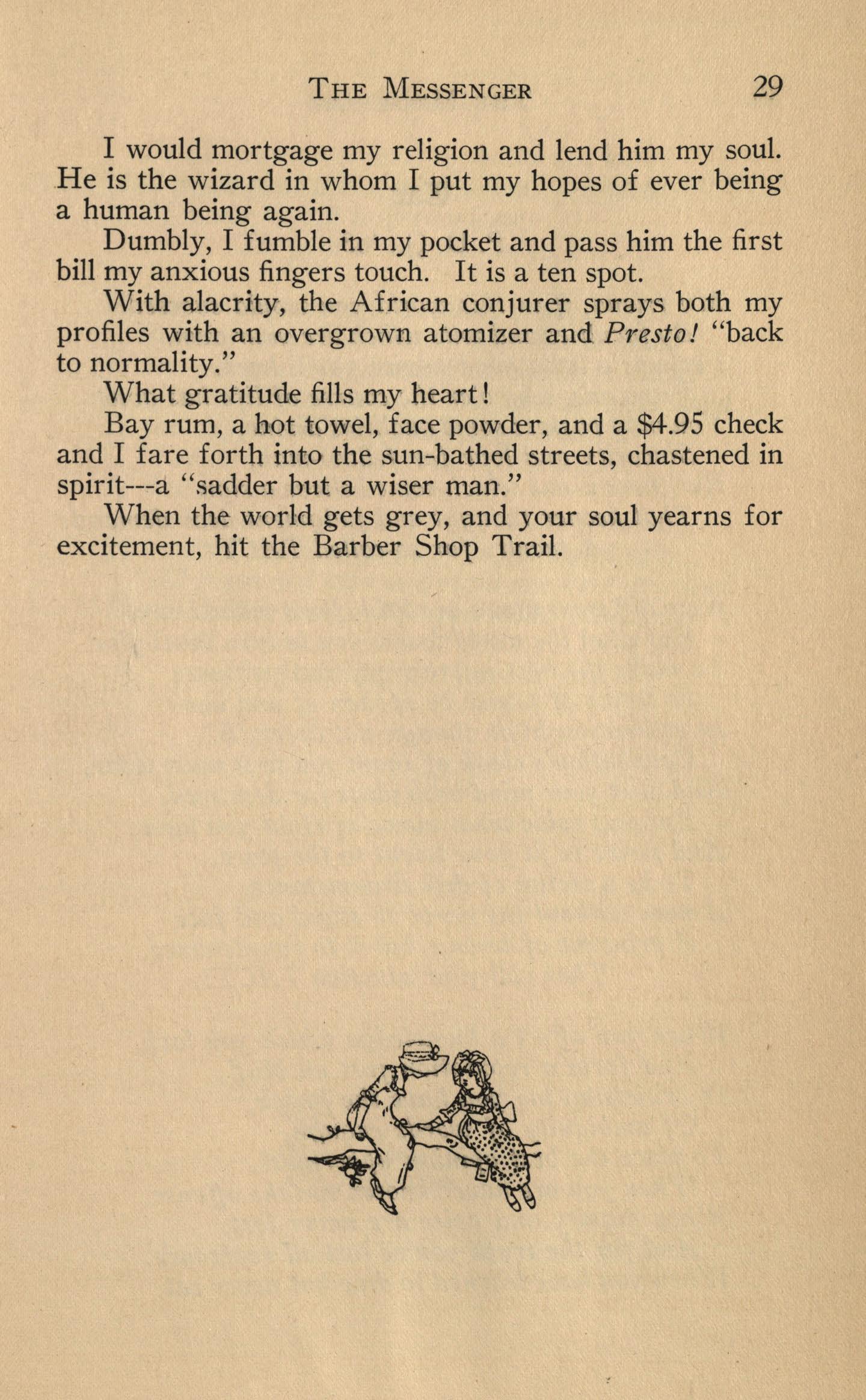
I would mortgage my religion and lend him my soul. He is the wizard in whom I put my hopes of ever being a human being again.
Dumbly, I fumble in my pocket and pass him the first bill my anxious fingers touch. It is a ten spot.
With alacrity , the African conjurer sprays both my profiles with an overgrown atomizer and Presto! " back to normality."
What gratitude fills my heart!
Bay rum, a hot towel, face powder, and a $4.95 check and I fare forth into the sun-bathed streets, chastened in spirit- --a " sadder but a wiser man."
When the world gets grey, and your soul yearns for excitement, hit the Barber Shop Trail.
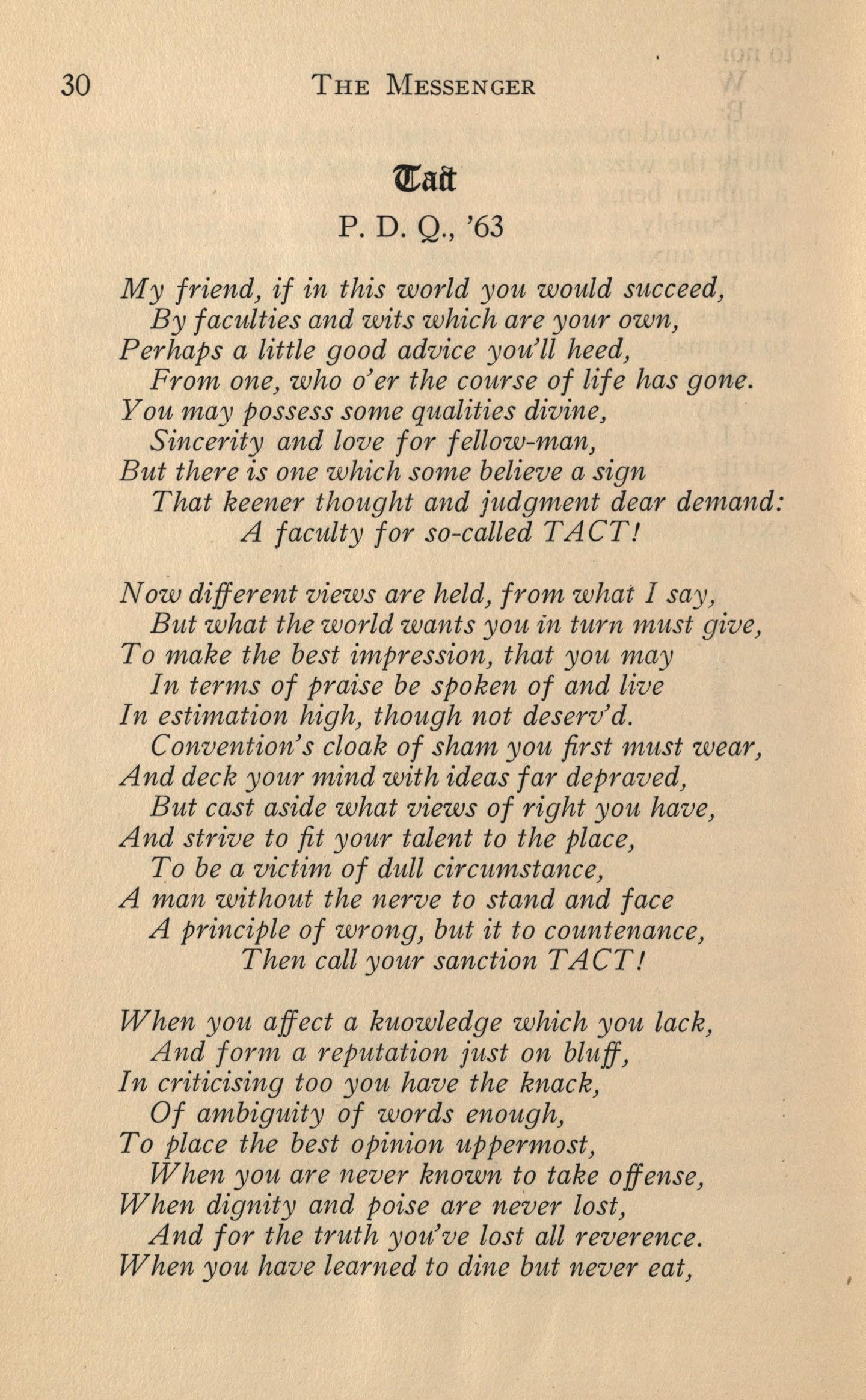
My friend, if in this world you would succeed, By faculties and wits which are your own, Perhaps a little good advice you'll heed, From one, who o'er the course of life has gone. You may possess some qualities divine, Sincerity and love for fellow-man, But there is one which some believe a sign That keener thought and judgment dear demand: A faculty for so-called TA CT!
Now different views are held, from what I say, But what the world wants you in turn must give, To make the best impression, that you may In terms of praise be spoken of and live In estimation high, though not deserv'd. Convention's cloak of sham you first must wear, And deck your mind with ideas far depraved , But cast aside what views of right you have, And strive to fit your talent to the place, To be a victim of dull circumstance, A man without the nerve to stand and face A principle of wrong, but it to countenance, Then call your sanction TA CT!
When you affect a kuowledge which you lack, And for111 , a reputation just on bluff, In criticising too you have the knack, Of ambiguity of words enough, To place the best opinion uppermost, When you are never known to take offense, When dignity and poise are never lost, And for the truth you've lost all reverence. When you have learned to dine but never eat,
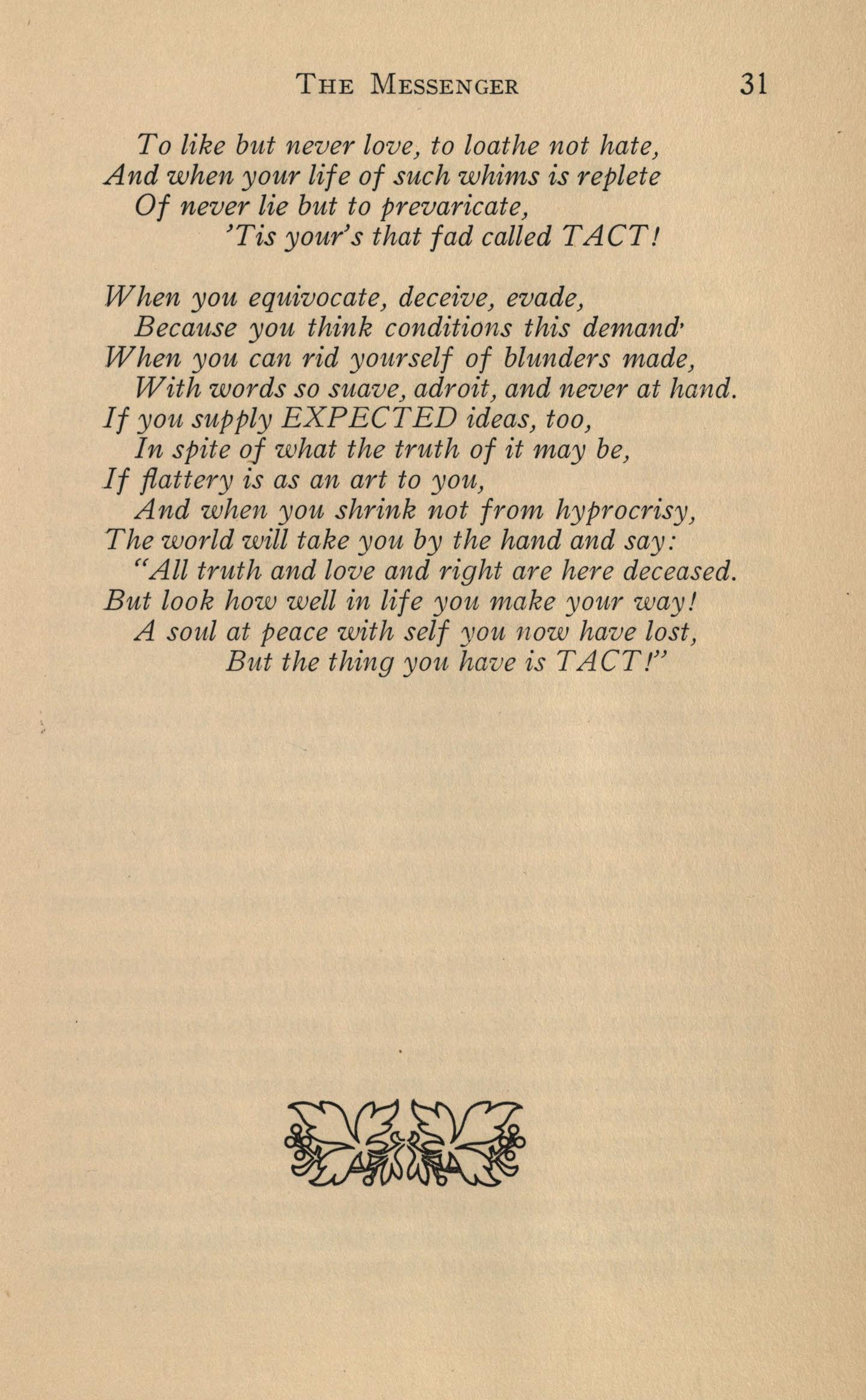
To like but never love, to loathe not hate, And when your life of such whims is replete Of never lie but to prevaricate, 'Tis your's that fad called TA CT!
.When you equivocate, deceive, evade, Because you think conditions this demand· When you can rid yourself of blunders made, With words so suave, adroit, and never at hand. If you supply EXPECTED ideas, too, In spite oj what the truth of it may be, If flattery is as an art to you, And when you shrink not from hyprocrisy, The world will take you by the hand and say: "All truth and love and right are here deceased. But look how well in life you make your way! A soul at peace with self you now have lost, But the thing you have is TACT!"
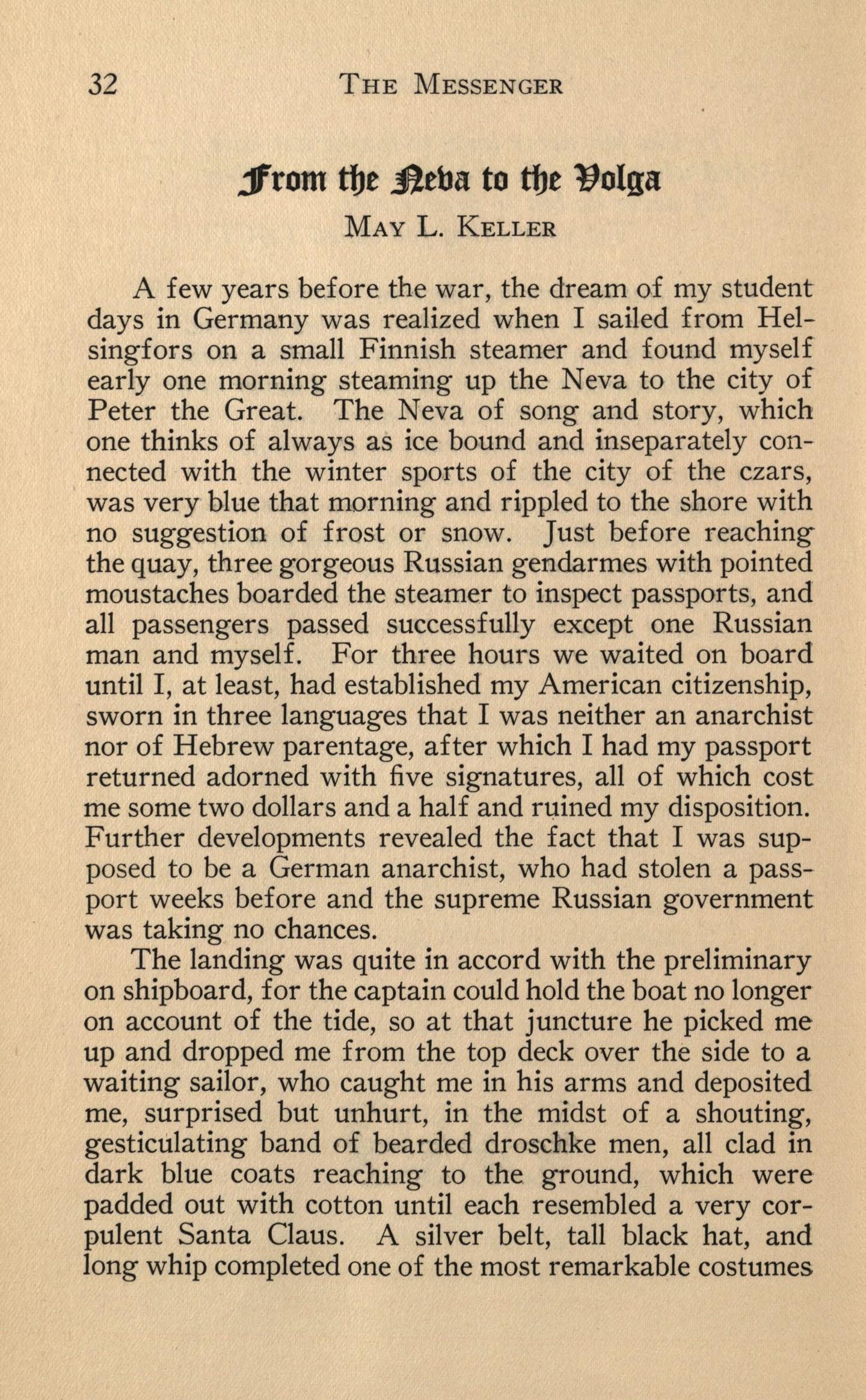
MAy L. KELLER
A few years before the war, the dream of my student days in Germany was realized when I sailed from Helsingfors on a small Finnish steamer and found myself early one morning steaming up the Neva to the city of Peter the Great. The Neva of song and story, which one thinks of always as ice bound and inseparately connected with the winter sports of the city of the czars, was very blue that morning and rippled to the shore with no suggestion of frost or snow. Just before reaching the quay, three gorgeous Russian gendarmes with pointed moustaches boarded the steamer to inspect passports, and all passengers passed successfully except one Russian man and myself. For three hours we waited on board until I, at least, had established my American citizenship, sworn in three languages that I was neither an anarchist nor of Hebrew parentage, after which I had my passport returned adorned with five signatures, all of which cost me some two dollars and a half and r~ined my disposition. Further developments revealed the fact that I was supposed to be a German anarchist, who had stolen a passport weeks before and the supreme Russian government was taking no chances.
The landing was quite in accord with the preliminary on shipboard, for the captain could hold the boat no longer on account of the tide, so at that juncture he picked me up and dropped me from the top deck over the side to a waiting sailor, who caught me in his arms and deposited me, surprised but unhurt, in the midst of a shouting, gesticulating band of bearded droschke men, all clad in dark blue coats reaching to the ground, which were padded out with cotton until each resembled a very corpulent Santa Claus. A silver belt, tall black hat, and long whip completed one of the most remarkable costumes
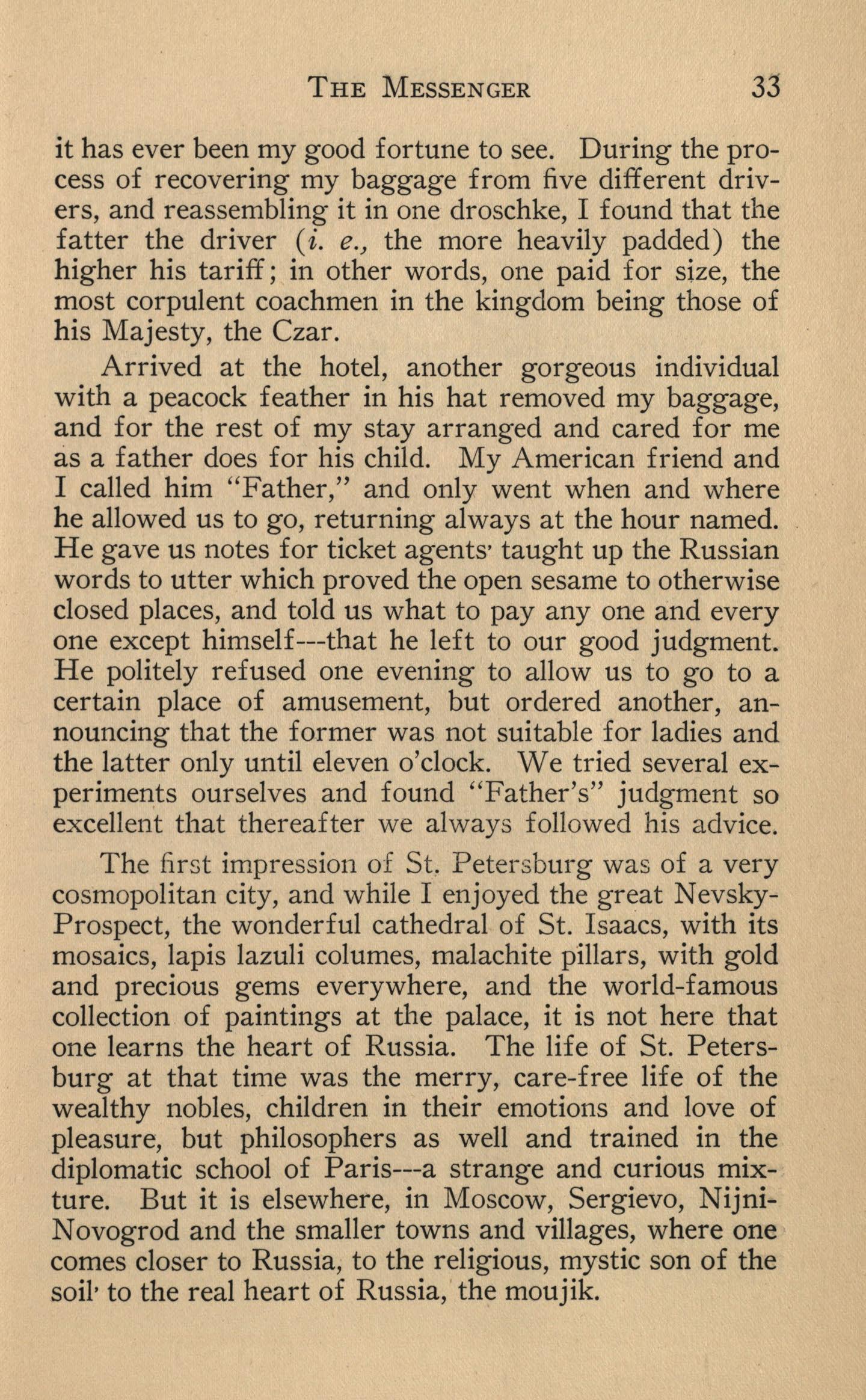
it has ever been my good fortune to see. During the process of recovering my baggage from five different drivers, and reassembling it in one droschke, I found that the fatter the driver (i. e., the more heavily padded) the higher his tariff; in other words, one paid for size, the most corpulent coachmen in the kingdom being those of his Majesty, the Czar.
Arrived at the hotel, another gorgeous individual with a peacock feather in his hat removed my baggage, and for the rest of my stay arranged and cared for me as a father does for his child. My American friend and I called him "Father," and only went when and where he allowed us to go, returning always at the hour named. He gave us notes for ticket agents· taught up the Russian words to utter which proved the open sesame to otherwise closed places, and told us what to pay any one and every one except himself---that he left to our good judgment. He politely refused one evening to allow us to go to a certain place of amusement, but ordered another, announcing that the former was not suitable for ladies and the latter only until eleven o'clock. We tried several experiments ourselves and found "Father's" judgment so excellent that thereafter we always followed his advice.
The fir s t impression of St. Peter sburg wa s of a very cosmopolitan city, and while I enjoyed the great NevskyProspect, the wonderful cathedral of St. Isaacs, with its mosaics, lapis lazuli columes, malachite pillars, with gold and precious gems everywhere, and the world-famous collection of paintings at the palace, it is not here that one learns the heart of Russia. The life of St. Petersburg at that time was the merry, care-free life of the wealthy nobles, children in their emotions and love of pleasure, but philosophers as well and trained in the diplomatic school of Paris---a strange and curious mixture. But it is elsewhere, in Moscow, Sergievo, NijniNovogrod and the smaller towns and villages, where one comes closer to Russia, to the religious, mystic son of the soil· to the real heart of Russia, the moujik.
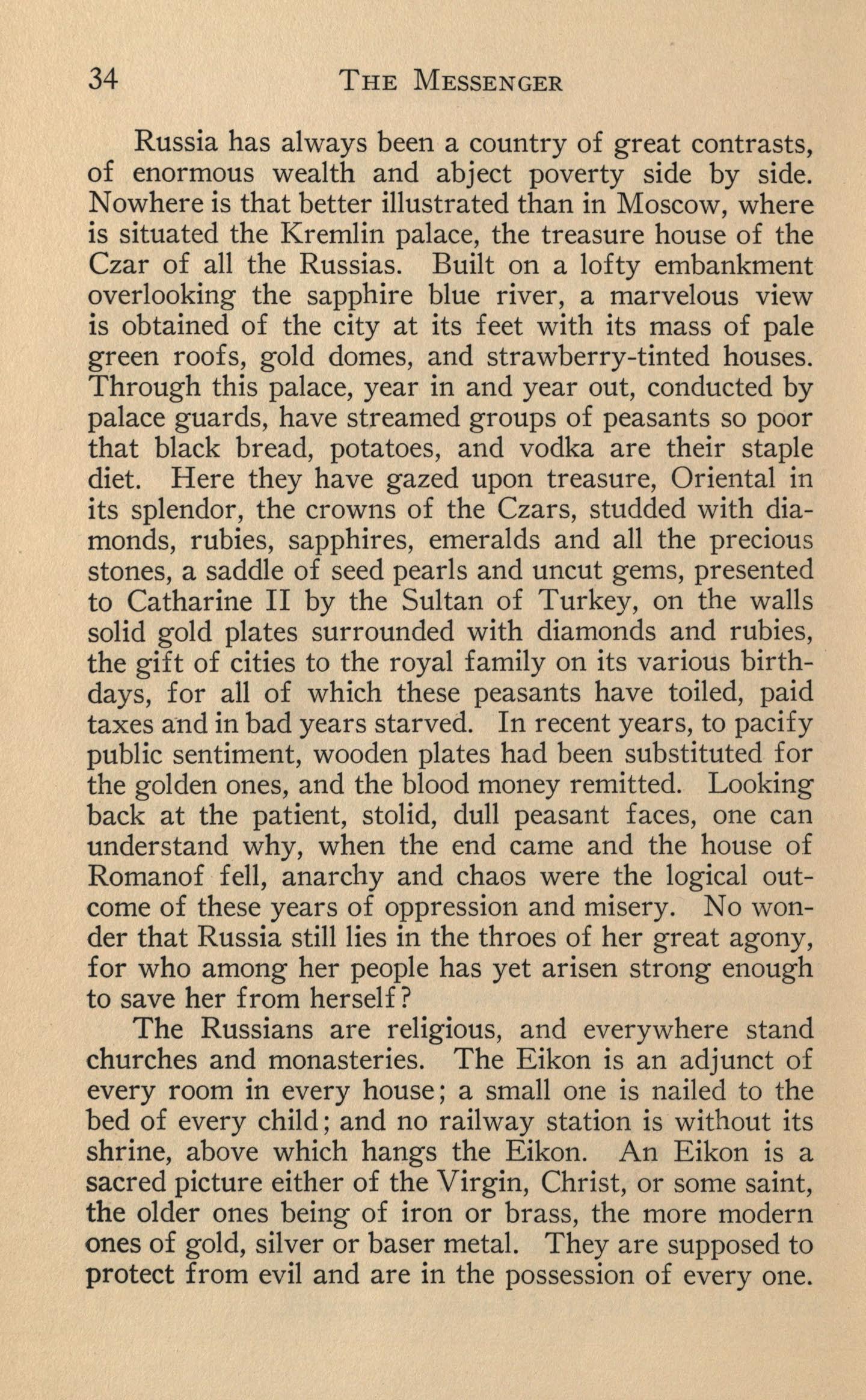
Russia has always been a country of great contrasts, of enormous wealth and abject poverty side by side. Nowhere is that better illustrated than in Moscow, where is situated the Kremlin palace, the treasure house of the Czar of all the Russias. Built on a lofty embankment overlooking the sapphire blue river, a marvelous view is obtained of the city at its feet with its mass of pale green roofs, gold domes, and strawberry-tinted houses. Through this palace, year in and year out, conducted by palace guards, have streamed groups of peasants so poor that black bread, potatoes, and vodka are their staple diet. Here they have gazed upon treasure, Oriental in its splendor, the crowns of the Czars, studded with diamonds, rubies, sapphires, emeralds and all the precious stones, a saddle of seed pearls and uncut gems, presented to Catharine II by the Sultan of Turkey, on the walls solid gold plates surrounded with diamonds and rubies, the gift of cities to the royal family on its various birthdays, for all of which these peasants have toiled, paid taxes a:nd in bad years starved. In recent years, to pacify public sentiment, wooden plates had been substituted for the golden ones, and the blood money remitted. Looking back at the patient, stolid, dull peasant faces, one can understand why, when the end came and the house of Romano£ fell, anarchy and chaos were the logical outcome of these years of oppression and misery. No wonder that Russia still lies in the throes of her great agony, for who among her people has yet arisen strong enough to save her from herself?
The Russians are religious, and everywhere stand churches and monasteries. The Eikon is an adjunct of every room in every house; a small one is nailed to the bed of every child; and no railway station is without its shrine, above which hangs the Eikon. An Eikon is a sacred picture either of the Virgin, Christ, or some saint, the older ones being of iron or brass, the more modern ones of gold, silver or baser metal. They are supposed to protect from evil and are in the possession of every one.
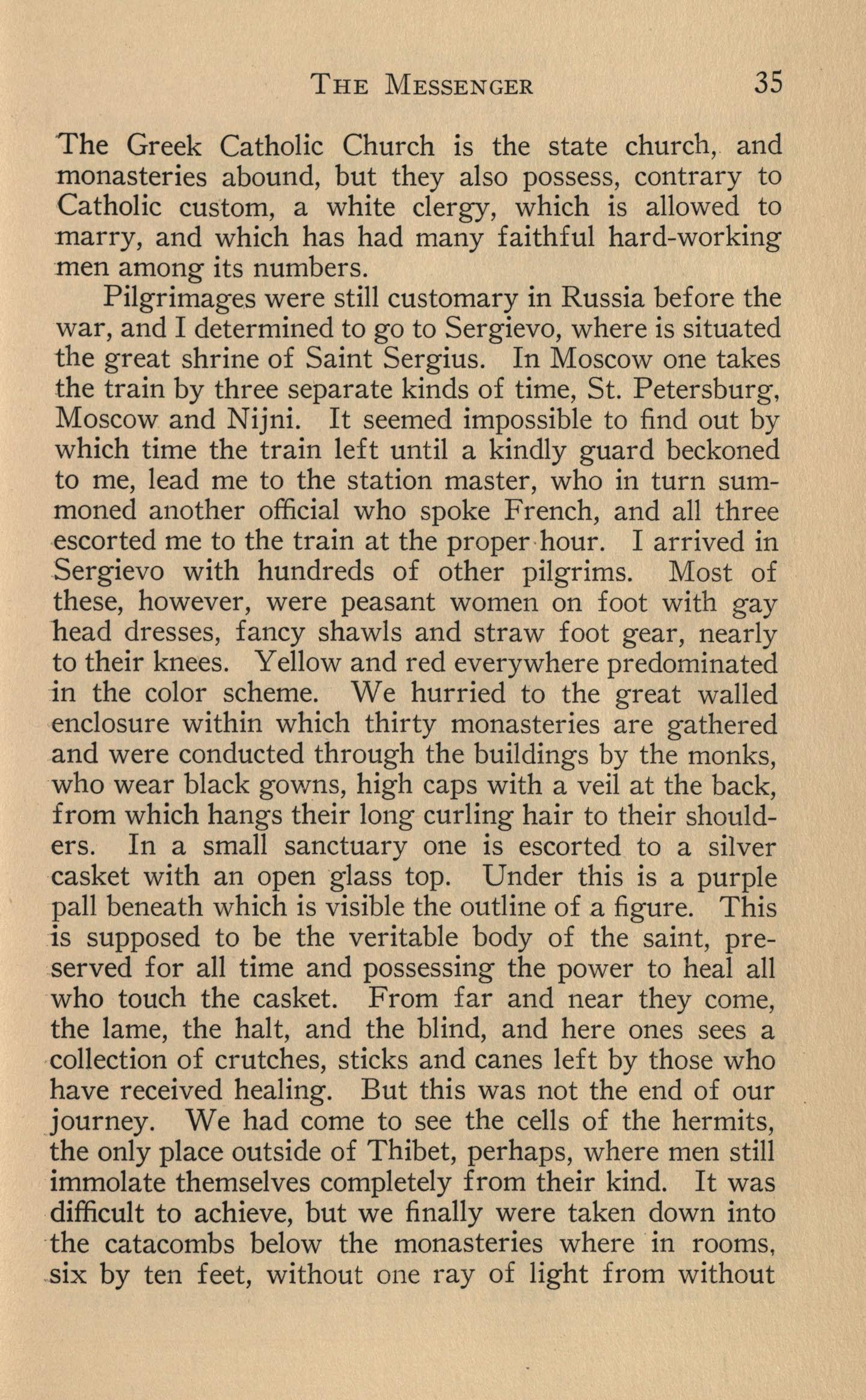
The Greek Catholic Church is the state church, and monasteries abound, but they also possess, contrary to Catholic custom, a white clergy, which is allowed to marry, and which has had many faithful hard-working men among its numbers.
Pilgrimages were still customary in Russia before the war, and I determined to go to Sergievo, where is situated the great shrine of Saint Sergius. In Moscow one takes the train by three separate kinds of time, St. Petersburg, Moscow and Nijni. It seemed impossible to find out by which time the train left until a kindly guard beckoned to me, lead me to the station master, who in turn summoned another official who spoke French, and all three -escorted me to the train at the proper -hour. I arrived in Sergievo with hundreds of other pilgrims. Most of these, however, were peasant women on foot with gay head dresses, fancy shawls and straw foot gear, nearly to their knees. Yellow and red everywhere predominated -in the color scheme. We hurried to the great walled enclosure within which thirty monasteries are gathered and were conducted through the buildings by the monks, who wear black gowns, high caps with a veil at the back, from which hangs their long curling hair to their shoulders. In a small sanctuary one is escorted to a silver casket with an open glass top. Under this is a purple pall beneath which is visible the outline of .a figure. This is supposed to be the veritable body of the saint, preserved for all time and possessing the power to heal all who touch the casket. From far and near they come, the lame, the halt, and the blind, and here ones sees a collection of crutches, sticks and canes left by those who have received healing. But this was not the end of our journey. We had come to see the cells of the hermits, the only place outside of Thibet, perhaps, where men still immolate themselves completely from their kind. It was -difficult to achieve, but we finally were taken down into ·the catacombs below the monasteries where ·in rooms, .six by ten feet, without one ray of light from without
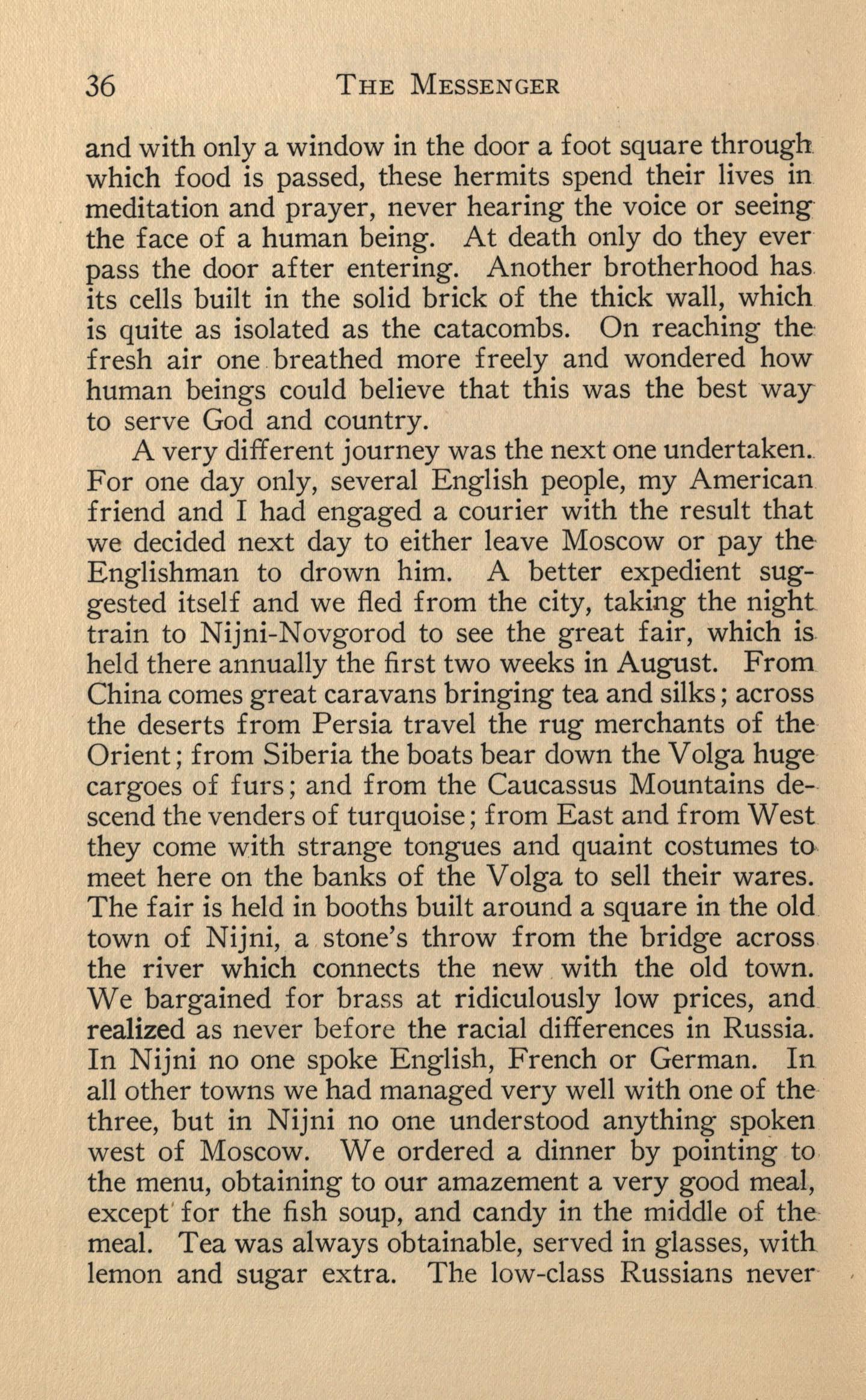
and with only a window in the door a foot square through which food is passed, these hermits spend their lives in meditation and prayer, never hearing the voice or seeing · the face of a human being. At death only do they ever pass the door after entering. Another brotherhood has its cells built in the solid brick of the thick wall, which is quite as isolated as the catacombs. On reaching the fresh air one .breathed more freely and wondered how human beings could believe that this was the best way to serve God and country.
A very different journey was the next one undertaken .. For one day only, several English people, my American friend and I had engaged a courier with the result that we decided next day to either leave Moscow or pay the Englishman to drown him. A better expedient suggested itself and we fled from the city, taking the night train to Nijni-Novgorod to see the great fair, which is. held there annually the first two weeks in August. From China comes great caravans bringing tea and silks; across the deserts from Persia travel the rug merchants of theOrient; from Siberia the boats bear down the Volga huge cargoes of furs; and from the Caucassus Mountains descend the venders of turquoise; from East and from West they come with strange tongues and quaint costumes to. meet here on the banks of the Volga to sell their wares. The fair is held in booths built around a square in the old town of Nijni, a stone's throw from the bridge across the river which connects the new with the old town. We bargained for bra ss at ridiculously low prices, and realized as never be fo r e the racial differences in Russia. In Nijni no one spoke English, French or German. In all other towns we had managed very well with one of thethree, but in Nijni no one understood anything spoken west of Moscow. We ordered a dinner by pointing to . the menu, obtaining to our amazement a very good meal, except' for the fish soup, and candy in the middle of themeal. Tea was always obtainable, served in glasses, with lemon and sugar extra. The low-class Russians never ·
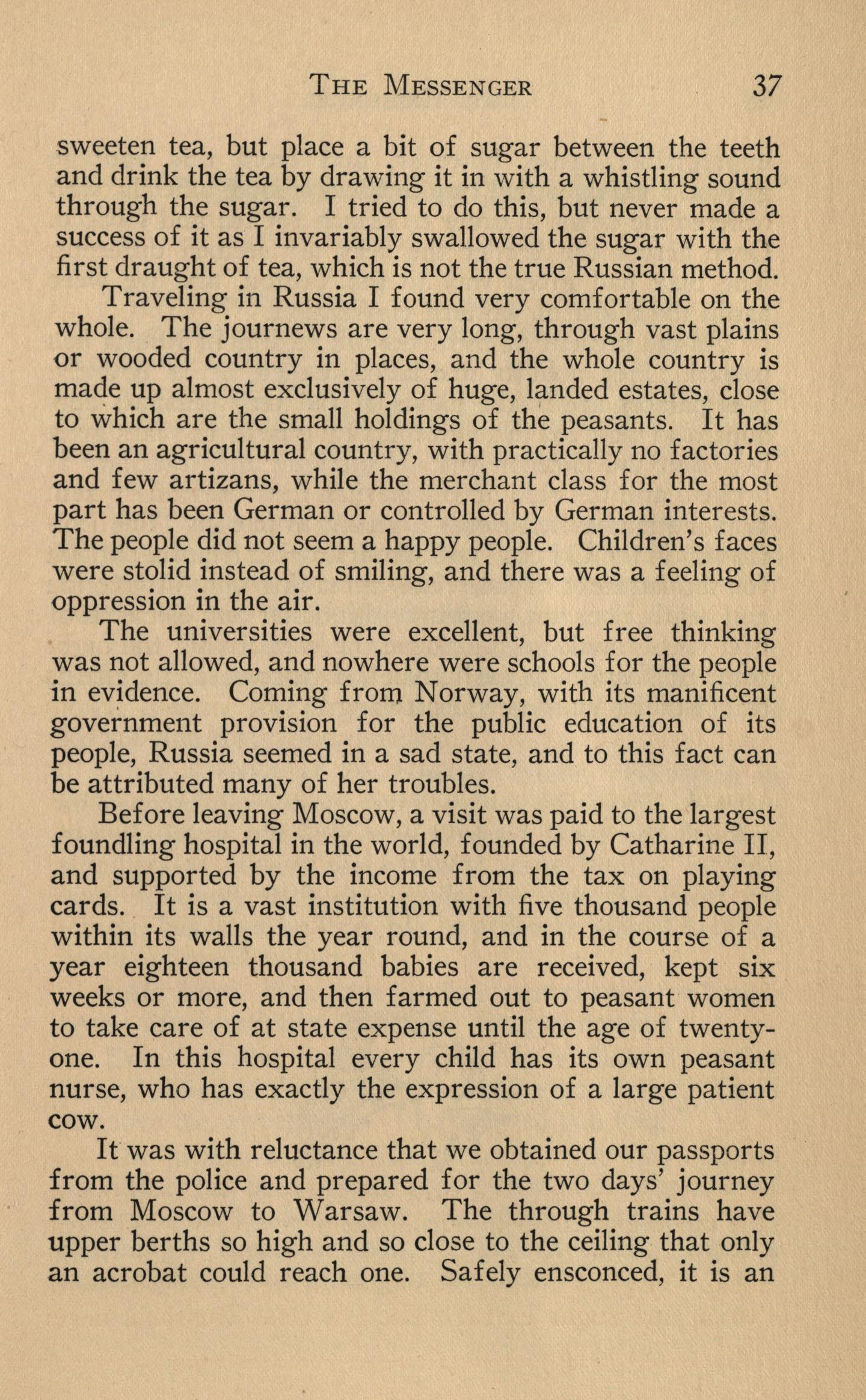
sweeten tea, but place a bit of sugar between the teeth and drink the tea by drawing it in with a whistling sound through the sugar. I tried to do this, but never made a success of it as I invariably swallowed the sugar with the first draught of tea, which is not the true Russian method. Traveling in Russia I found very comfortable on the whole. The journews are very long, through vast plains or wooded country in places, and the whole country is made up almost exclusively of huge, landed estates, close to which are the small holdings of the peasants. It has been an agricultural country, with practically no factories and few artizans, while the merchant class for the most part has been German or controlled by German interests. The people did not seem a happy people. Children's faces were stolid instead of smiling, and there was a feeling of oppression in the air.
The universities were excellent, but free thinking was not allowed, and nowhere were schools for the people in evidence. Coming from Norway, with its manificent government provision for the public education of its people, Russia seemed in a sad state, and to this fact can be attributed many of her troubles.
Before leaving Moscow, a visit was paid to the largest foundling hospital in the world, founded by Catharine II, and supported by the income from the tax on playing cards. It is a vast institution with five thousand people within its walls the year round, and in the course of a year eighteen thousand babies are received, kept six weeks or more, and then farmed out to peasant women to take care of at state expense until the age of twentyone. In this hospital every child has its own peasant nurse, who has exactly the expression of a large patient cow.
It was with reluctance that we obtained our passports from the police and prepared for the two days' journey from Moscow to Warsaw. The through trains have upper berths so high and so close to the ceiling that only an acrobat could reach one. Safely ensconced, it is an
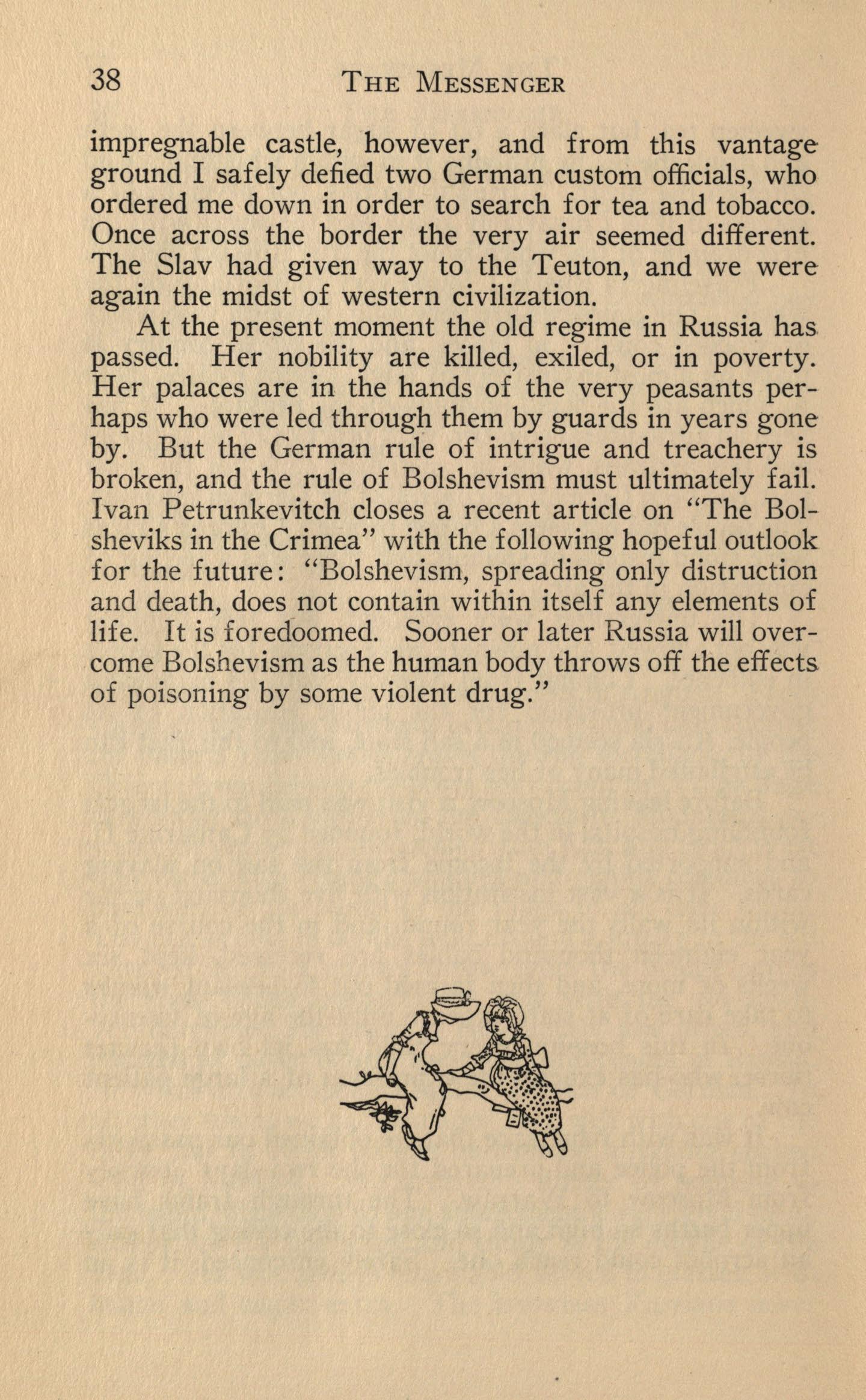
impregnable castle, however, and from this vantage ground I safely defied two German custom officials, who ordered me down in order to search for tea and tobacco. Once across the border the very air seemed different. The Slav had given way to the Teuton, and we were again the midst of western civilization.
At the present moment the old regime in Russia has. passed. Her nobility are killed, exiled, or in poverty. Her palaces are in the hands of the very peasants perhaps who were led through them by guards in years gone by. But the German rule of intrigue and treachery is broken, and the rule of Bolshevism must ultimately fail. Ivan Petrunkevitch closes a recent article on "The Bolsheviks in the Crimea" with the following hopeful outlook for the future: "Bolshevism, spreading only distruction and death, does not contain within itself any elements of life. It is foredoomed. Sooner or later Russia will overcome Bolshevism as the human body throws off the effects. of poisoning by some violent drug."
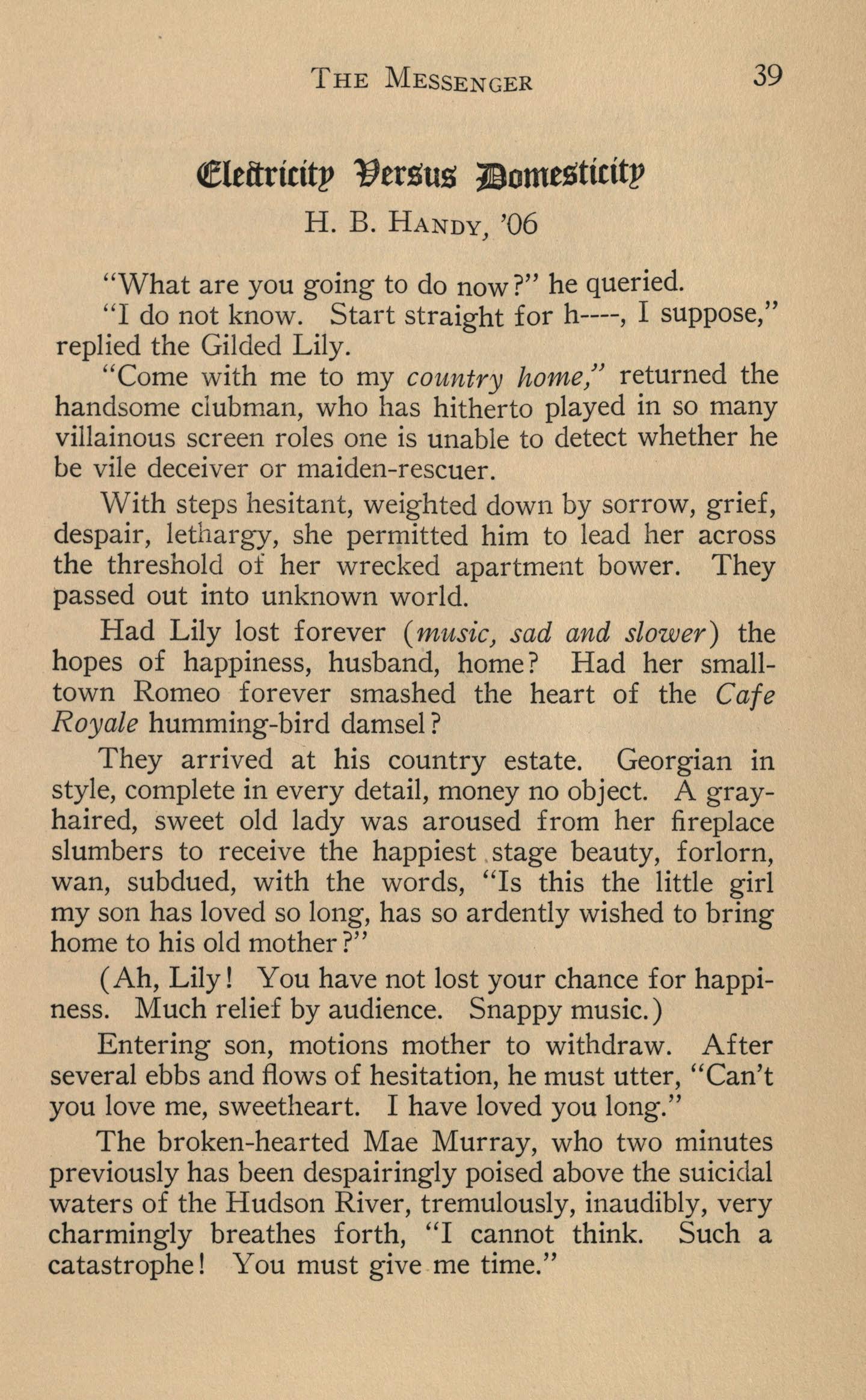
H. B. HANDY, '06
"What are you going to do now?" he queried.
"I do not know. Start straight for h----, I suppose," replied the Gilded Lily.
"Come with me to my country home," returned the handsome clubman, who has hitherto played in so many villainous screen roles one is unable to detect whether he be vile deceiver or maiden-rescuer.
With steps hesitant, weighted down by sorrow, grief, despair, lethargy, she permitted him to lead her across the threshold of her wrecked apartment bower. They passed out into unknown world.
Had Lily lost forever ( music, sad and slower) the hopes of happiness, husband, home? Had her smalltown Romeo forever smashed the heart of the Cafe Royale humming-bird damsel?
They arrived at his country estate. Georgian in style, complete in every detail, money no object. A grayhaired, sweet old lady was aroused from her fireplace slumbers to receive the happiest ,stage beauty, forlorn, wan, subdued, with the words, "Is this the little girl my son has loved so long, has so ardently wished to bring home to his old mother?"
( Ah, Lily! You have not lost your chance for happiness. Much relief by audience. Snappy music.)
Entering son, motions mother to withdraw. After several ebbs and flows of hesitation, he must utter, "Can't you love me, sweetheart. I have loved you long."
The broken-hearted Mae Murray, who two minutes previously has been despairingly poised above the suicidal waters of the Hudson River, tremulously, inaudibly, very charmingly breathes forth, "I cannot think. Such a catastrophe! You must give me time."
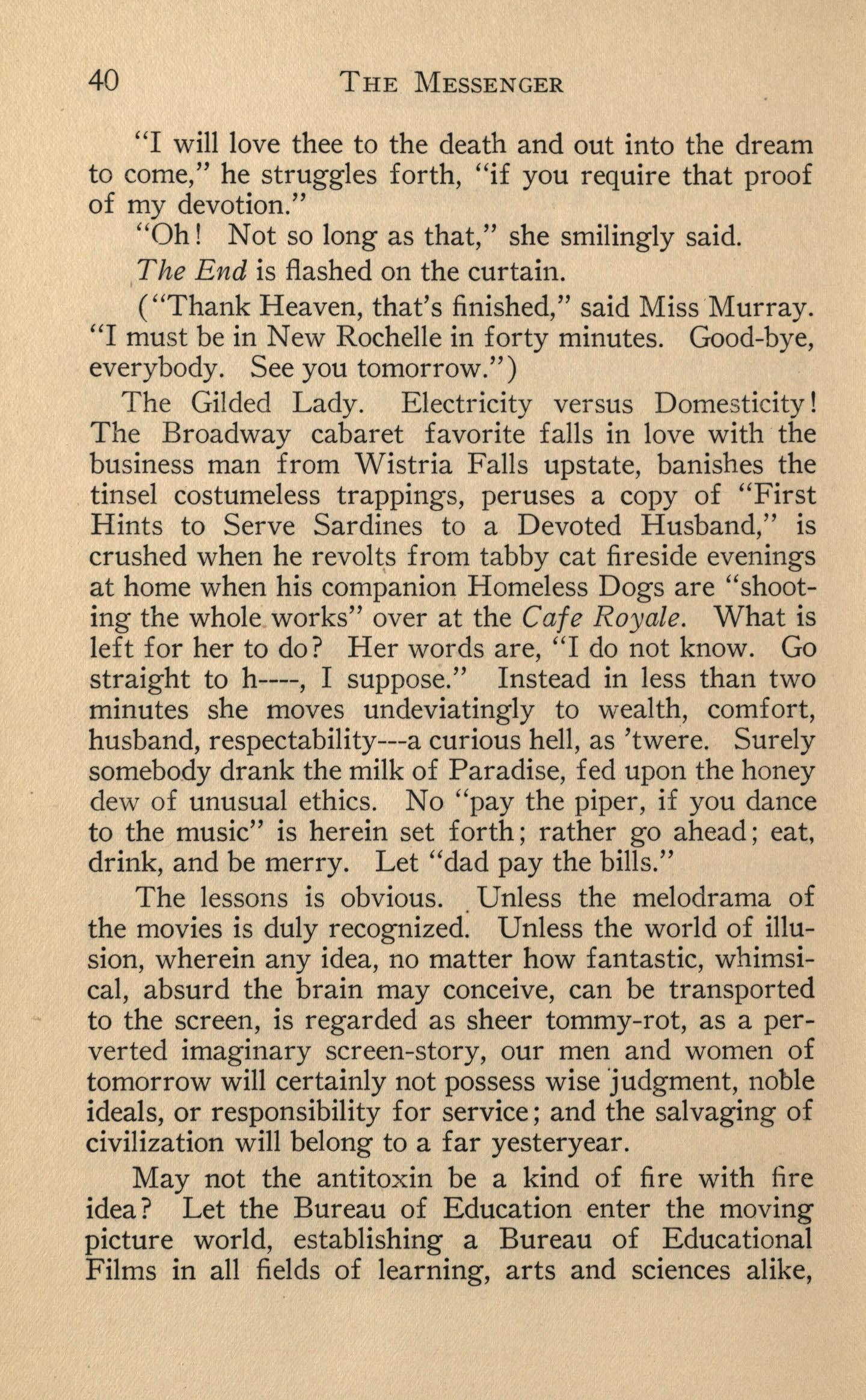
"I will love thee to the death and out into the dream to come," he struggles forth, "if you require that proof of my devotion."
"Oh! Not so long as that," she smilingly said.
,The End is flashed on the curtain.
("Thank Heaven, that's finished," said Miss ·Murray. "I must be in New Rochelle in forty minutes. Good-bye, everybody. See you tomorrow.")
The Gilded Lady. Electricity versus Dome sticity! The Broadway cabaret favorite falls in love with the business man from Wistria Falls upstate, banishes the tinsel costumeless trappings, peruses a copy of "First Hints to Serve Sardines to a Devoted Husband," is crushed when he revol~s from tabby cat fireside evenings at home when his companion Homeless Dogs are "shooting the whole works" over at the Cafe Royale. What is le£t for her to do? Her words are, "I do not know. Go straight to h----, I suppose." Instead in less than two minutes she moves undeviatingly to wealth, comfort, husband, respectability---a curious hell, as 'twere. Surely somebody drank the milk of Paradise, fed upon the honey dew of unusual ethics. No "pay the piper, if you dance to the music" is herein set forth; rather go ahead; eat, drink, and be merry. Let "dad pay the bills."
The lessons is obvious. Unless the melodrama of the movies is duly recognized: Unless the world of illusion, wherein any idea, no matter how fantastic, whimsical, absurd the brain may conceive, can be transported to the screen, is regarded as sheer tommy-rot, as a perverted imaginary screen-story, our men and women of tomorrow will certainly not possess wise judgment, noble ideals, or responsibility for service; and the salvaging of civilization will belong to a far yesteryear.
May not the antitoxin be a kind of fire with fire idea? Let the Bureau of Education enter the moving picture world, establishing a Bureau of Educational Films in all fields of learning, arts and sciences alike,
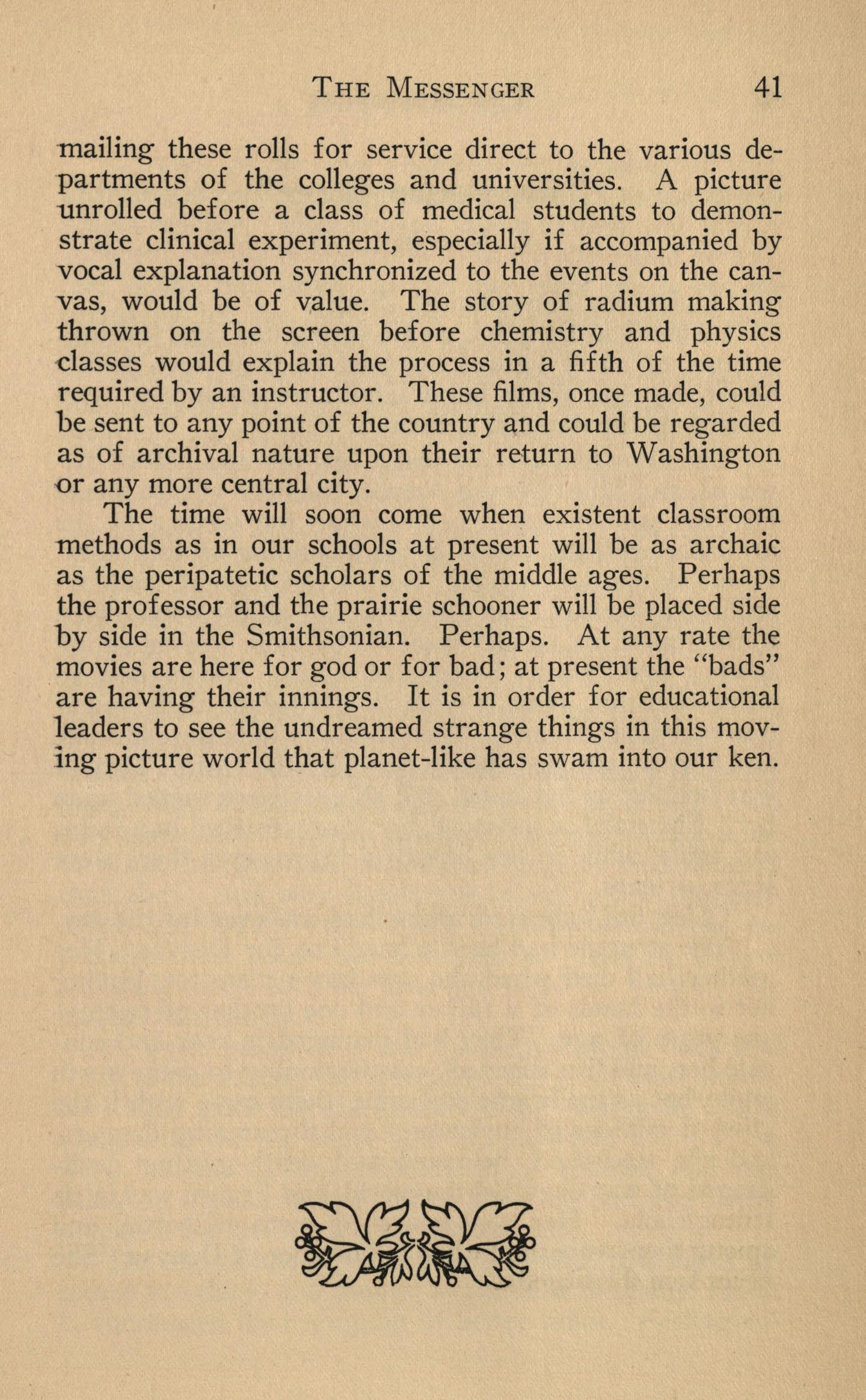
mailing these rolls for service direct to the various departments of the colleges and universities. A picture unrolled before a class of medical students to demonstrate clinical experiment, especially if accompanied by vocal explanation synchronized to the events on the canvas, would be of value. The story of radium making thrown on the screen before chemistry and physics dasses would explain the process in a fifth of the time required by an instructor. These films, once made, could be sent to any point of the country and could be regarded as of archival nature upon their return to Washington or any more central city.
The time will soon come when existent classroom methods as in our schools at present will be as archaic as the peripatetic scholars of the middle ages. Perhaps the professor and the prairie schooner will be placed side by side in the Smithsonian. Perhaps. At any rate the movies are here for god or for bad; at present the "bads" are having their innings. It is in order for educational leaders to see the undreamed strange things in this moving picture world that planet-like has swam into our ken.
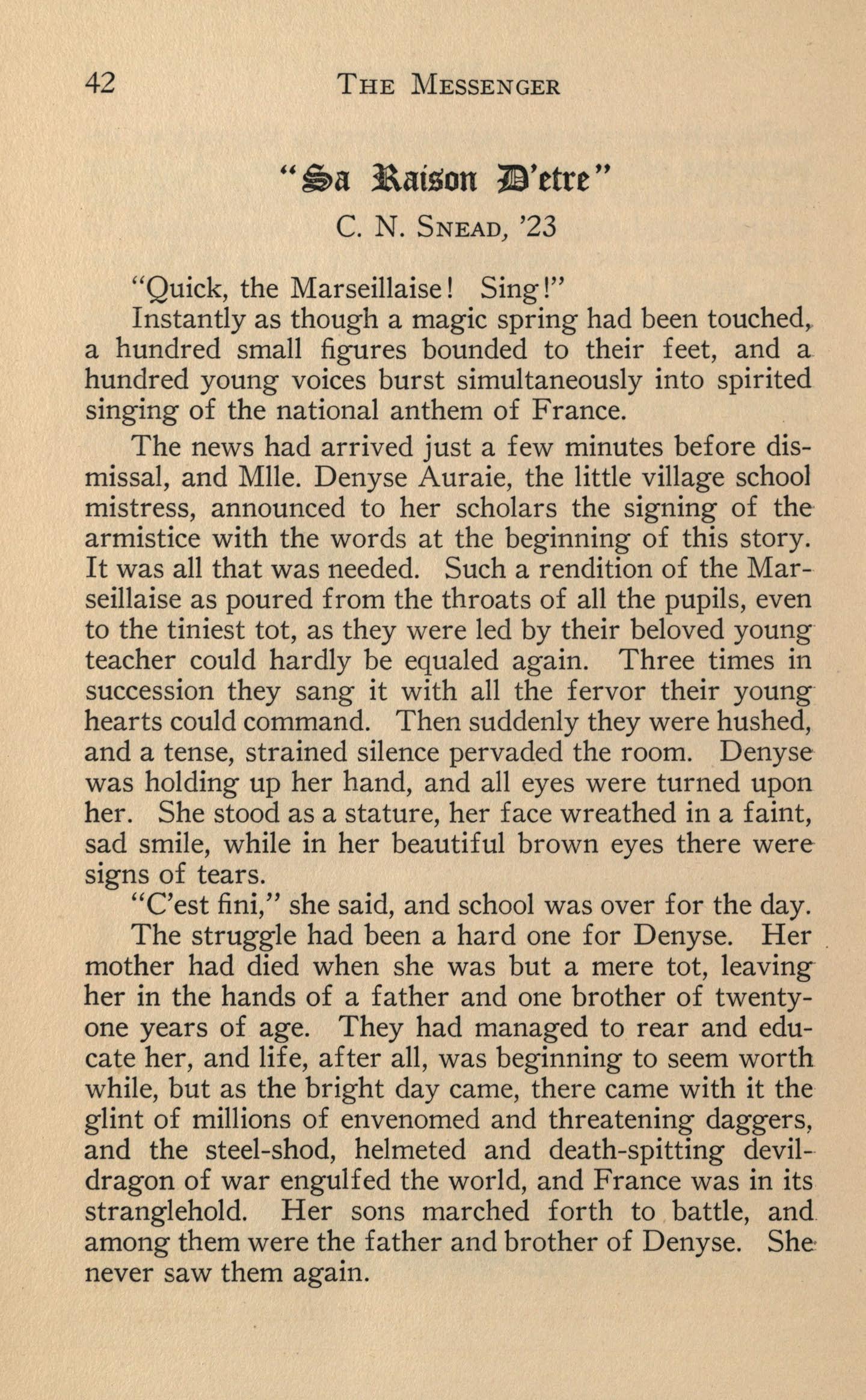
C. N. SNEAD, '23
"Quick, the Marseillaise! Sing!"
Instantly as though a magic spring had been touched ,, a hundred small figures bounded to their feet, and a hundred young voices burst simultaneously into spirited singing of the national anthem of France. The news had arrived just a few minutes before dismissal, and Mlle. Denyse Auraie, the little village school mistress, announced to her scholars the signing of thearmistice with the words at the beginning of this story. It was all that was needed. Such a rendition of the Marseillaise as poured from the throats of all the pupils, even to the tiniest tot, as they were led by their beloved young teacher could hardly be equaled again. Three times in succession they sang it with all the fervor their younghearts could command. Then suddenly they were hushed, and a tense, strained silence pervaded the room. Denysewas holding up her hand, and all eyes were turned upon her. She stood as a stature, her face wreathed in a faint, sad smile, while in her beautiful brown eyes there weresigns of tears.
"C'est fini," she said, and school was over for the day. The struggle had been a hard one for Denyse. Her _ mother had died when she was but a mere tot, leavingher in the hands of a father and one brother of twentyone years of age. They had managed to rear and educate her, and life, after all, was beginning to seem worth while, but as the bright day came, there came with it the glint of millions of envenomed and threatening daggers, and the steel-shod, helmeted and death-spitting devil-dragon of war engulfed the world, and France was in its stranglehold. Her sons marched forth to battle, and . among them were the father and brother of Denyse. She never saw them again.
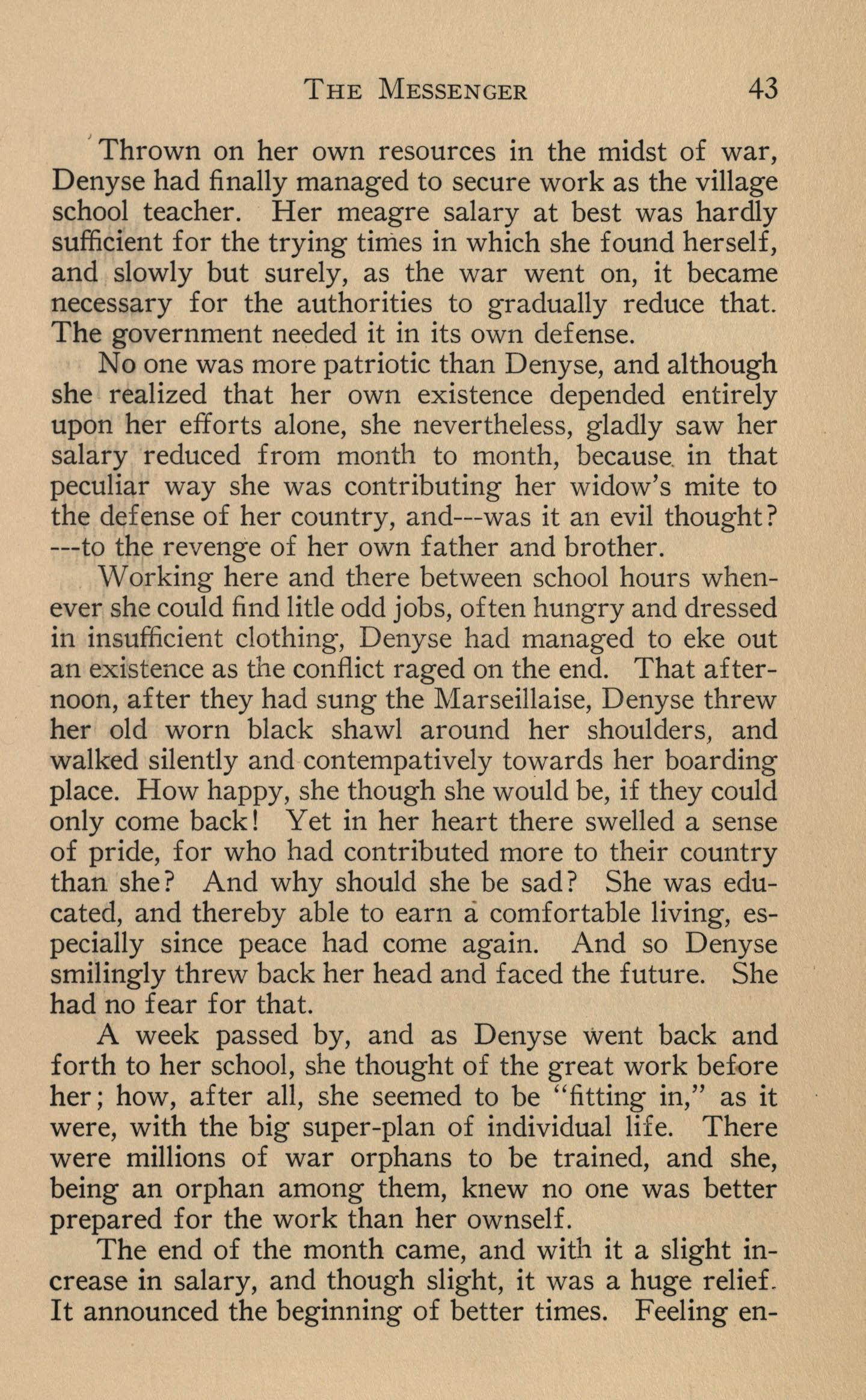
' Thrown on her own resources in the midst of war, Denyse had finally managed to secure work as the village school teacher. Her meagre salary at best was hardly sufficient for the trying times in which she found herself, and slowly but surely, as the war went on, it became necessary for the authorities to gradually reduce that. The government needed it in its own defense.
No one was more patriotic than Denyse, and although she realized that her own existence depended entirely upon her efforts alone, she nevertheless, gladly saw her salary reduced from month to month, because . in that peculiar way she was contributing her widow's mite to the defense of her country, and---was it an evil thought? ---to the revenge of her own father and brother.
Working here and there between school hours whenever she could find litle odd jobs, often hungry and dressed in insufficient clothing, Denyse had managed to eke out an existence as the conflict raged on the end. That afternoon, after they had sung the Marseillaise, Denyse threw her old worn black shawl around her shoulders, and walked silently and contempatively towards her boarding place. How happy, she though she would be, if they could only come back! Yet in her heart there swelled a sense of pride, for who had contributed more to their country than she? And why should she be sad? She was educated, and thereby able to earn a comfortable living, especially since peace had come again. And so Denyse smilingly threw back her head and faced the future. She had no fear for that.
A week passed by, and as Denyse Went back and forth to her school, she thought of the great work before her; how, after all, she seemed to be "fitting in," as it were, with the big super-plan of individual life. There were millions of war orphans to be trained, and she, being an orphan among them, knew no one was better prepared for the work than her ownself.
The end of the month came, and with it a slight increase in salary, and though slight, it was a huge relief. It announced the beginning of better times. Feeling en-
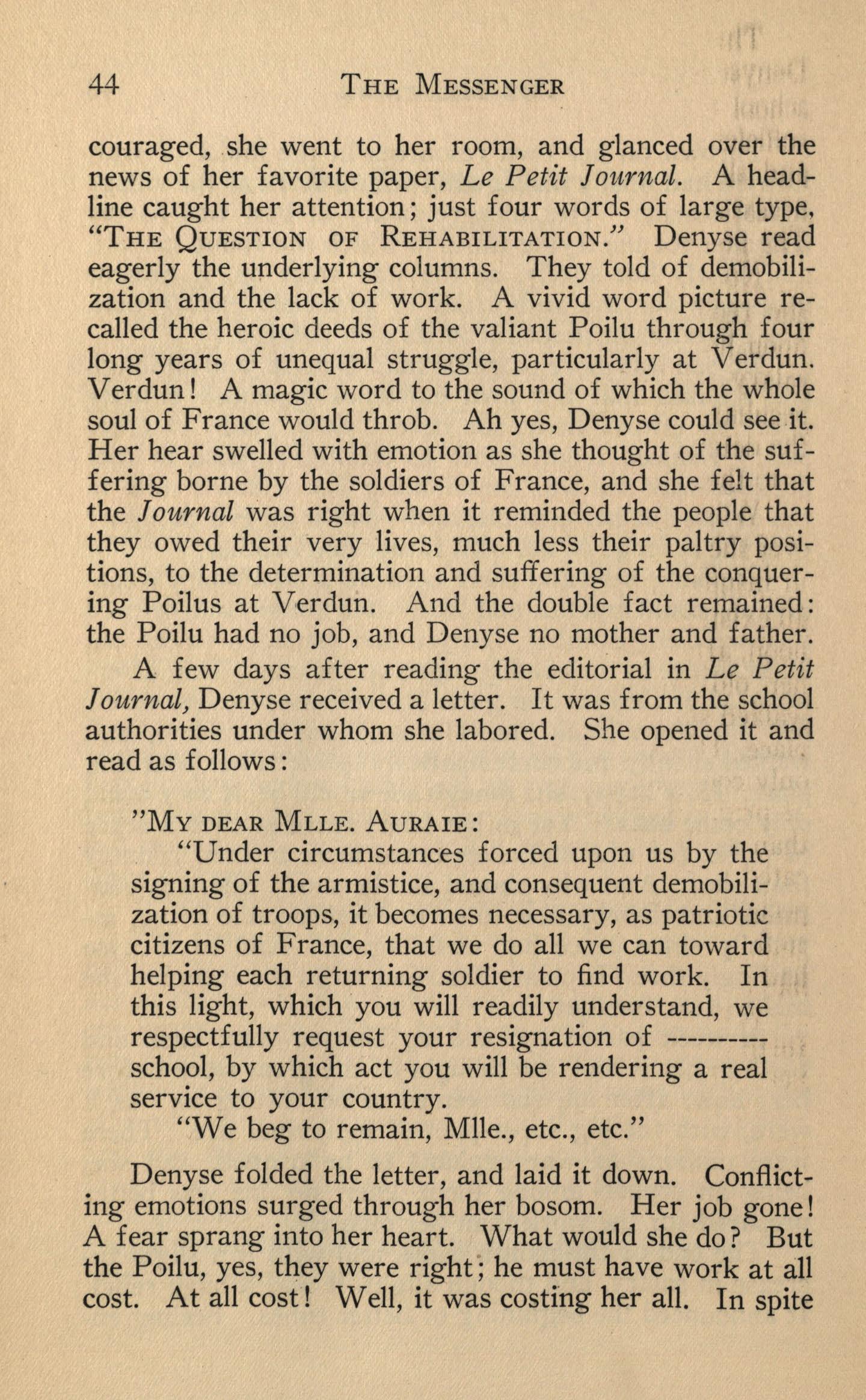
couraged, .she went to her room, and glanced over the news of her favorite paper, Le Petit Journal. A headline caught her attention; just four words of large type, "THE QUESTION OF REHABILITATION." Denyse read eagerly the underlying columns. They told of demobilization and the lack of work. A vivid word picture recalled the heroic deeds of the valiant Poilu through four long years of unequal struggle, particularly at Verdun. Verdun! A magic word to the sound of which the whole soul of France would throb. Ah yes, Denyse could see it. Her hear swelled with emotion as she thought of the suffering borne by the soldiers of France, and she felt that the Journal was right when it reminded the people that they owed their very lives, much less their paltry positions, to the determination and suffering of the conquering Poilus at Verdun. And the double fact remained: the Poilu had no job, and Denyse no mother and father.
A few days after reading the editorial in Le Petit Journal, Denyse received a letter. It was from the school authorities under whom she labored. She opened it and read as follows :
"Under circumstances forced upon us by the signing of the armistice, and consequent demobilization of troops, it becomes necessary, as patriotic citizens of France, that we do all we can toward helping each returning soldier to find work. In this light, which you will readily understand, we respectfully request your resignation of ---------school, by which act you will be rendering a real service to your country.
"We beg to remain, Mlle., etc., etc."
Denyse folded the letter, and laid it down. Conflicting emotions surged through her bosom. Her job gone! A fear sprang into her heart. What would she do? But the Poilu, yes, they were right; he must have work at all cost. At all cost! Well, it was costing her all. In spite
of her willingness to give over her job, her heart sank within her, for there was nothing else she could do---no work to be had at any price! The future that so shortly before had seemed so bright now stood a fiendish, fearful, haunting spectre, grinning with a devilish mockery in her face. She recoiled from the very thoughts of it. No work! Then, there remained for her suffering, from hunger, starvation---death ! It could mean nothing less. Nothing, nothing but death---nothing? Denyse startled. Why had that word come as a question? No, there was nothing for her young soul---young ?---yes, young and pretty, someone had said to her that very morning. Pretty? A still small voice kept saying, young and pretty, -is there nothing for you but death?
Denyse almost screamed. The spectre was laughing now outright, but she smiled instead. · "Silly," she said, and throwing her black shawl around her, she started out for an afternoon's walk in the woods.
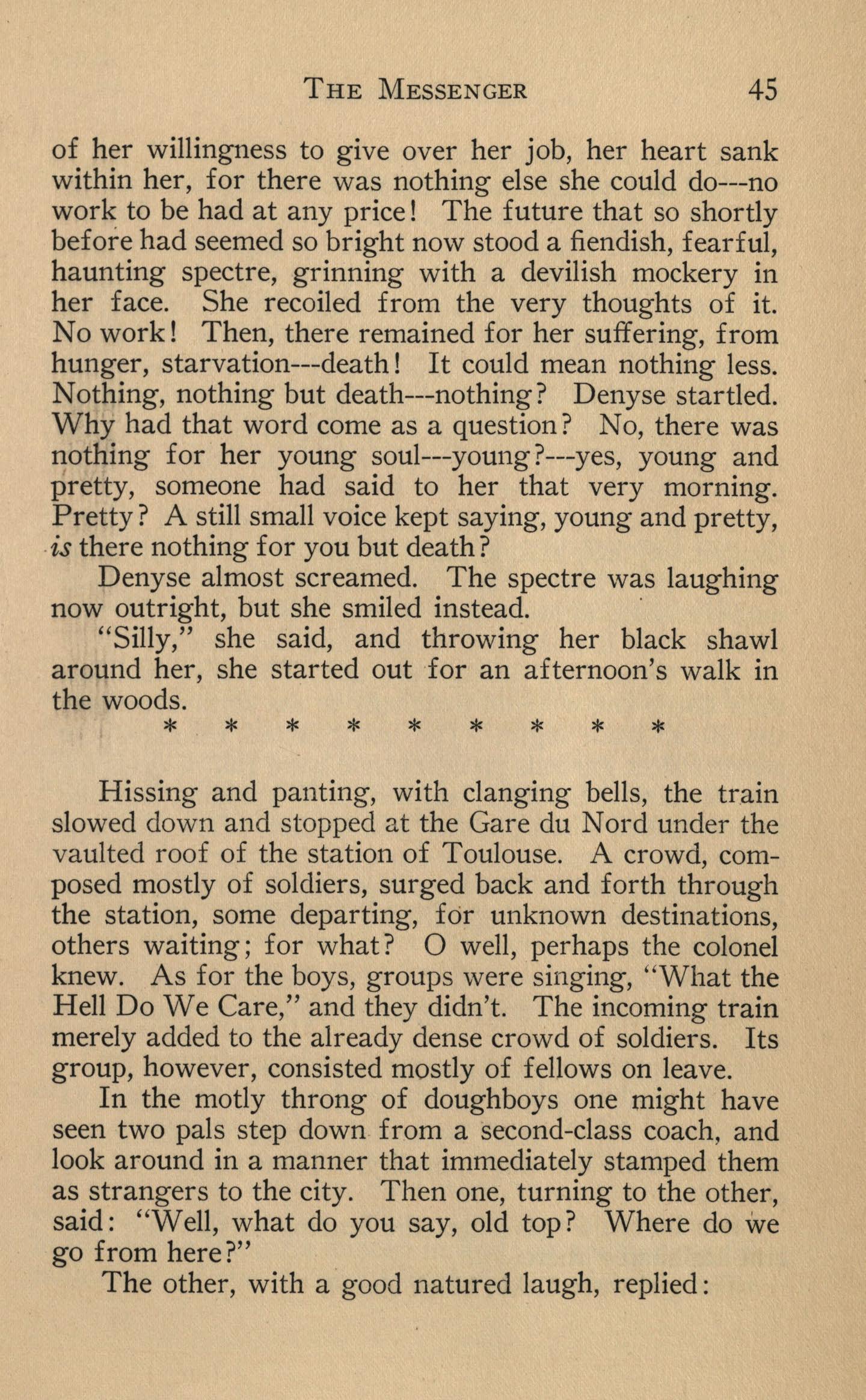
Hissing and panting, with clanging bells, the train slowed down and stopped at the Gare du Nord under the vaulted roof of the station of Toulouse. A crowd, composed mostly of soldiers, surged back and forth through the station, some departing, for unknown destinations, others waiting; for what? 0 well, perhaps the colonel knew. As for the boys, groups were singing, "What the Hell Do We Care," and they didn't. The incoming train merely added to the already dense crowd of soldiers. Its group, however, consisted mostly of fellows on leave.
In the motly throng of doughboys one might have seen two pals step down from a second-class coach, and look around in a manner that immediately stamped them as strangers to the city. Then one, turning to the other, said: "Well, what do you say, old top? Where do we go from here?"
The other, with a ·good natured laugh, replied:
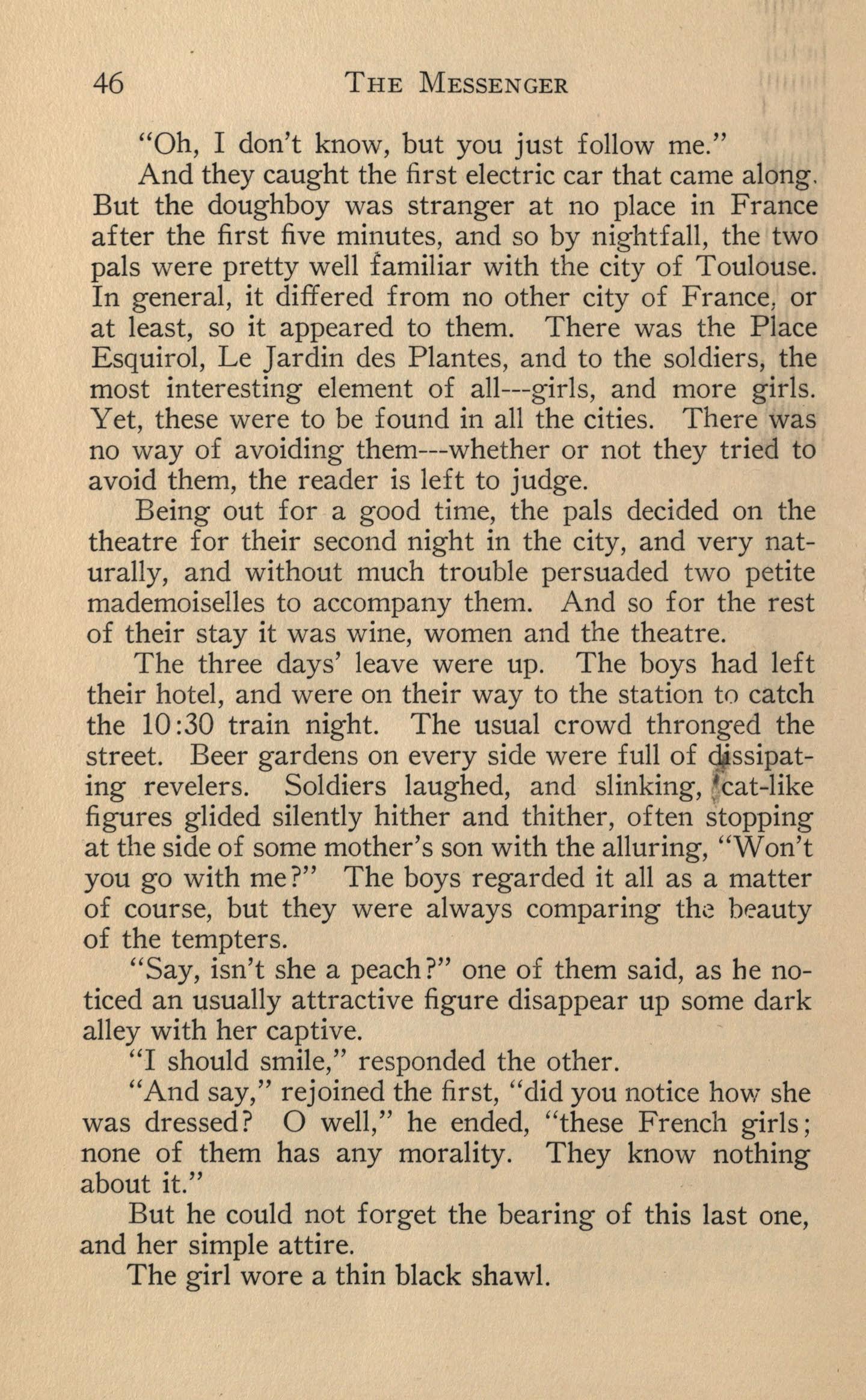
"Oh, I don't know, but you just follow me."
And they caught the first electric car that came along. But the doughboy was stranger at no place in France after the first five minutes, and so by nightfall, the two pals were pretty well familiar with the city of Toulouse. In general, it differed from no other city of France, or at least, so it appeared to them. There was the Place Esquirol, Le Jardin des Plantes, and to the soldiers, the most interesting element of all---girls, and more girls. Yet, these were to be found in all the cities. There was no way of avoiding them---whether or not they tried to avoid them, the reader is left to judge.
Being out for a good time, the pals decided on the theatre for their second night in the city, and very naturally, and without much trouble persuaded two petite mademoiselles to accompany them. And so for the rest of their stay it was wine, women and the theatre.
The three days' leave were up. The boys had left their hotel, and were on their way to the station to catch the 10 :30 train night. The usual crowd thronged the street. Beer gardens on every side were full of q;.ssipating revelers. Soldiers laughed, and slinking, cat-like figures glided silently hither and thither, often stopping at the side of some mother's son with the alluring, "Won't you go with me?" The boys regarded it all as a matter of course, but they were always comparing the beauty of the tempters.
"Say, isn't she a peach?" one of them said, as he noticed an usually attractive figure disappear up some dark alley with her captive.
"I should smile," responded the other.
"And say," rejoined the first, "did you notice how she was dressed? 0 well," he ended, "these French girls; none of them has any morality. They know nothing about it."
But he could not forget the bearing of this last one, and her simple attire.
The girl wore a thin black shawl.
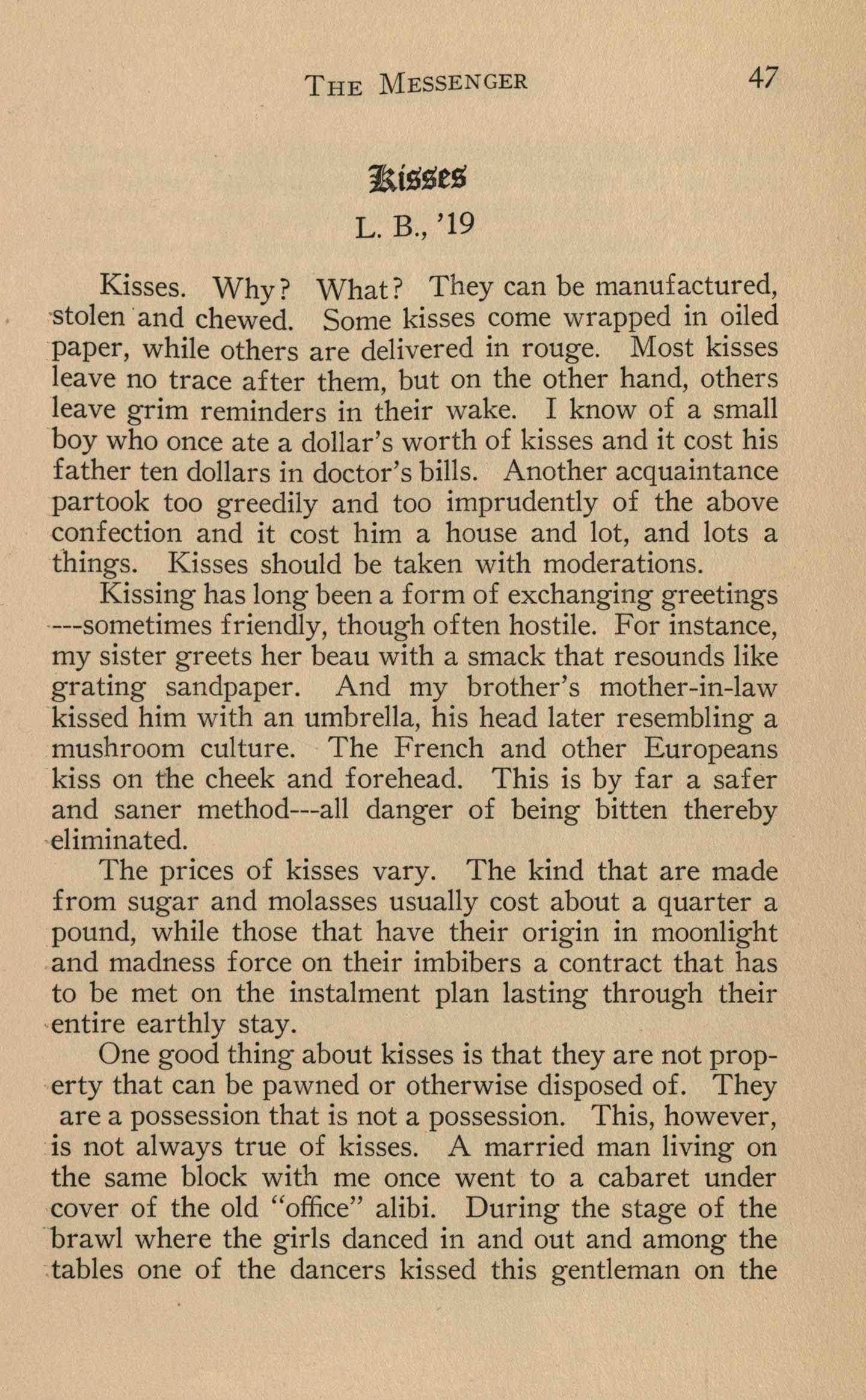
Kisses. Why? What? They can be manufactured, ·stolen ·and chewed. Some kisses come wrapped in oiled paper, while others are delivered in rouge . Most kisses leave no trace after them, but on the other hand, others leave grim reminders in their wake. I know of a small boy who once ate a dollar's worth of kisses and it cost his father ten dollars in doctor's bills. Another acquaintance partook too greedily and too imprudently of the above confection and it cost him a house and lot, and lots a things. Kisses should be taken with moderations.
Kissing has long been a form of exchanging greetings ----sometimes friendly, though often hostile. For instance, my sister greets her beau with a smack that resounds like grating sandpaper. And my brother's mother-in-law kissed him with an umbrella, his head later resembling a mushroom culture. The French and other Europeans kiss on the cheek and forehead. This is by far a safer and saner method---all danger of being bitten thereby eliminated.
The prices of kisses vary. The kind that are made from sugar and molasses usually cost about a quarter a pound, while those that have their origin in moonlight and madness force on their imbibers a contract that has to be met on the instalment plan lasting through their entire earthly stay.
One good thing about kisses is that they are not property that can be pawned or otherwise disposed of. They are a possession that is not a possession. This, however, is not always true of kisses . A married man living on the same block with me once went to a cabaret under cover of the old "office" alibi. During the stage of the ·brawl where the girls danced in and out and among the .tables one of the dancers kissed this gentleman on the
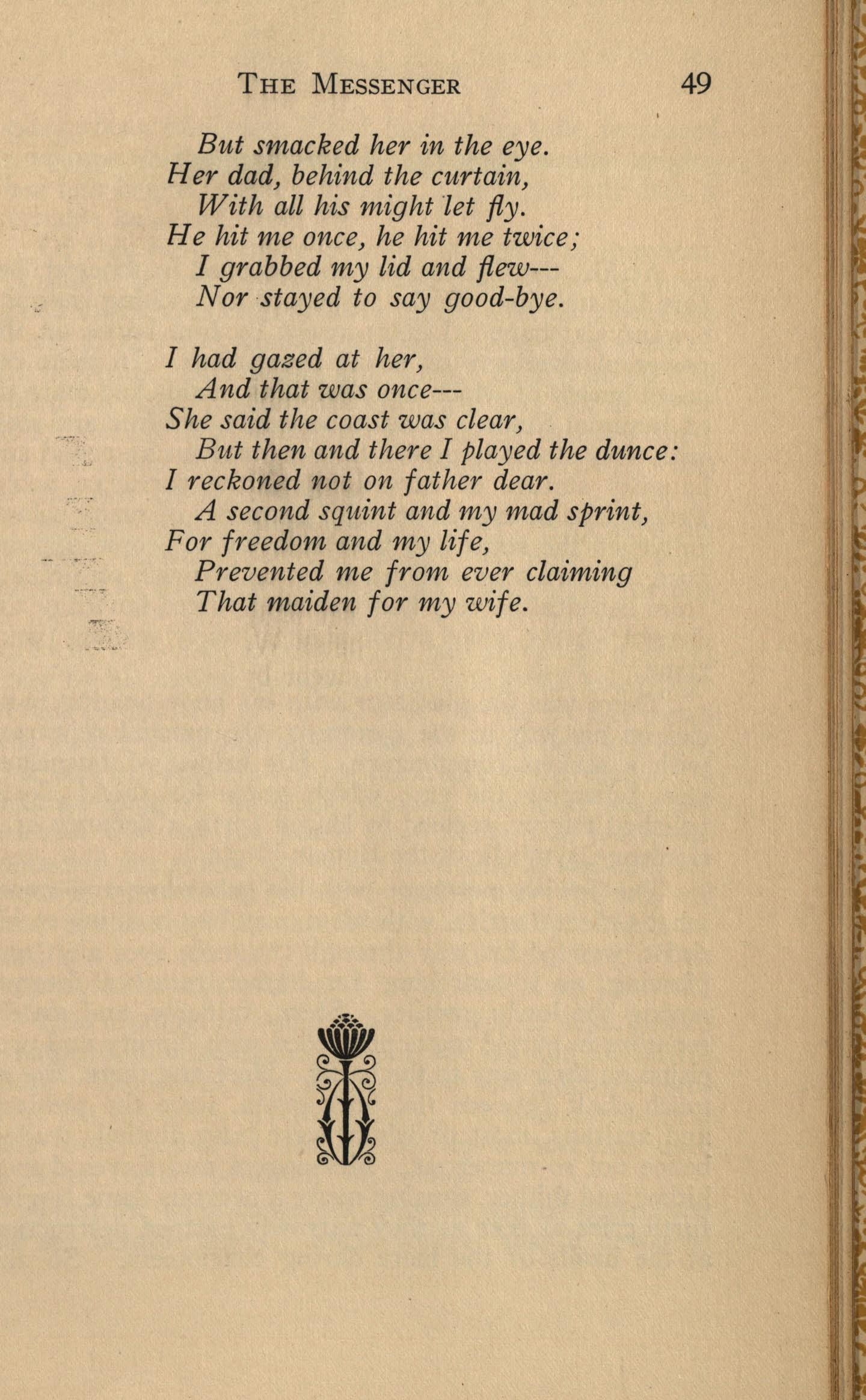
But smacked her in the eye. Her dad, behind the curtain, With all his might let fly. He hit me once, he hit me twice; I grabbed my lid and ftew--N or stayed to say good-bye.
I had gazed at her, And that was once--She said the coast was clear, But then and there I played the dunce: I reckoned not on father dear. A second squint and my mad sprint, For freedom and my life, Prevented me from ever claiming That maiden for my wife.
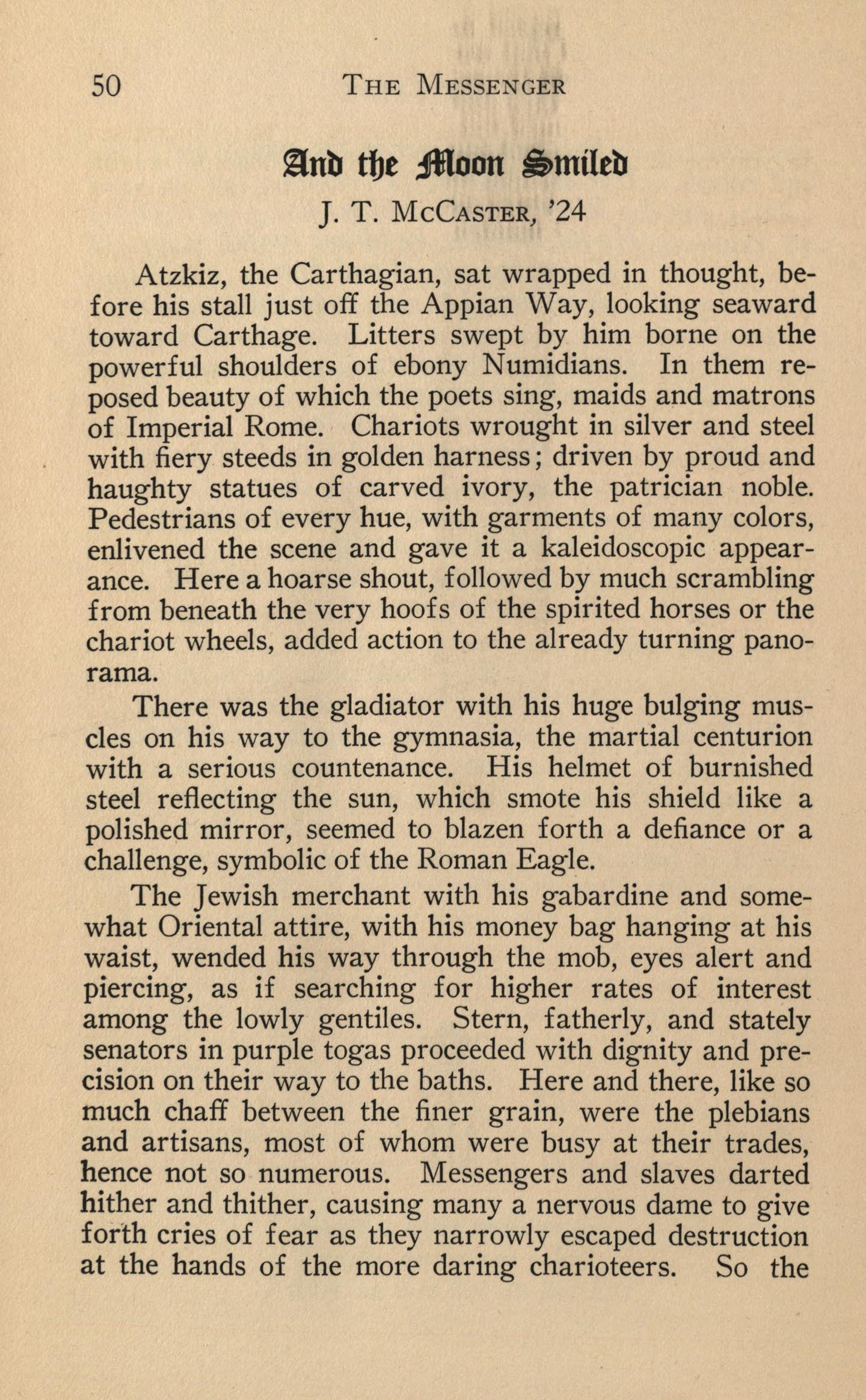
J. T. McCAsTER,
Atzkiz, the Carthagian, sat wrapped in thought, before his stall just off the Appian Way, looking seaward toward Carthage. Litters swept by him borne on the powerful shoulders of ebony N umidians. In them reposed beauty of which the poets sing, maids and matrons of Imperial Rome. Chariots wrought in silver and steel with fiery steeds in golden harness; driven by proud and haughty statues of carved ivory, the patrician noble. Pedestrians of every hue, with garments of many colors, enlivened the scene and gave it a kaleidoscopic appearance. Here a hoarse shout, followed by much scrambling from beneath the very hoofs of the spirited horses or the chariot wheels, added action to the already turning panorama.
There was the gladiator with his huge bulging muscles on his way to the gymnasia, the martial centurion with a serious countenance. His helmet of burnished steel reflecting the sun, which smote his shield like a polished mirror, seemed to blazen forth a defiance or a challenge, symbolic of the Roman Eagle.
The Jewish merchant with his gabardine and somewhat Oriental attire, with his money bag hanging at his waist, wended his way through the mob, eyes alert and piercing, as if searching for higher rates of interest among the lowly gentiles. Stern, fatherly, and stately senators in purple togas proceeded with dignity and precision on their way to the baths. Here and there, like so much chaff between the finer grain, were the plebians and artisans, most of whom were busy at their trades, hence not so numerous. Messengers and slaves darted hither and thither, causing many a nervous dame to give forth cries of fear as they narrowly escaped destruction at the hands of the more daring charioteers. So the
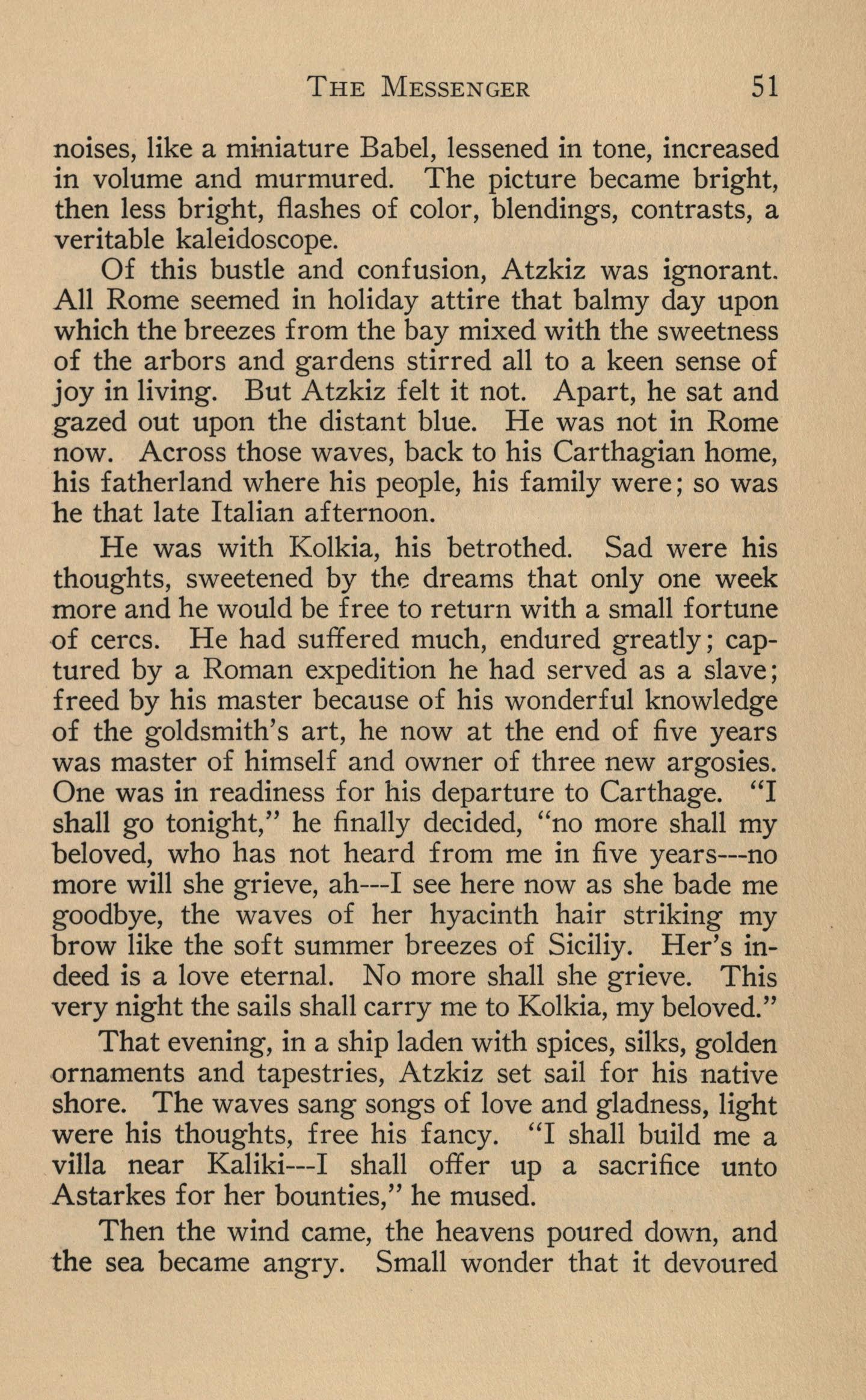
noises, like a miniature Babel, lessened in tone, increased in volume and murmured. The picture became bright, then less bright, flashes of color, blendings, contrasts, a veritable kaleidoscope.
Of this bustle and confusion, Atzkiz was ignorant. All Rome seemed in holiday attire that balmy day upon which the breezes from the bay mixed with the sweetness of the arbors and gardens stirred all to a keen sense of joy in living. But Atzkiz felt it not. Apart, he sat and gazed out upon the distant blue. He was not in Rome now. Across those waves, back to his Carthagian home, his fatherland where his people, his family were; so was he that late Italian afternoon.
He was with Kolkia, his betrothed. Sad were his thoughts, sweetened by the dreams that only one week more and he would be free to return with a small fortune of cercs. He had suffered much, endured greatly; captured by a Roman expedition he had served as a slave; freed by his master because of his wonderful knowledge of the goldsmith's art, he now at the end of five years was master of himself and owner of three new argosies. One was in readiness for his departure to Carthage. "I shall go tonight," he finally decided, "no more shall my beloved, who has not heard from me in five years---no more will she grieve, ah---I see here now as she bade me goodbye, the waves of her hyacinth hair striking my brow like the soft summer breezes of Siciliy. Ber's indeed is a love eternal. No more shall she grieve. This very night the sails shall carry me to Kolkia, my beloved."
That evening, in a ship laden with spices, silks, golden ,ornaments and tapestries, Atzkiz set sail for his native shore. The waves sang songs of love and gladness, light were his thoughts, free his fancy. "I shall build me a villa near Kaliki---I shall offer up a sacrifice unto Astarkes for her bounties," he mused.
Then the wind came, the heavens poured down, and the sea became angry. Small wonder that it devoured
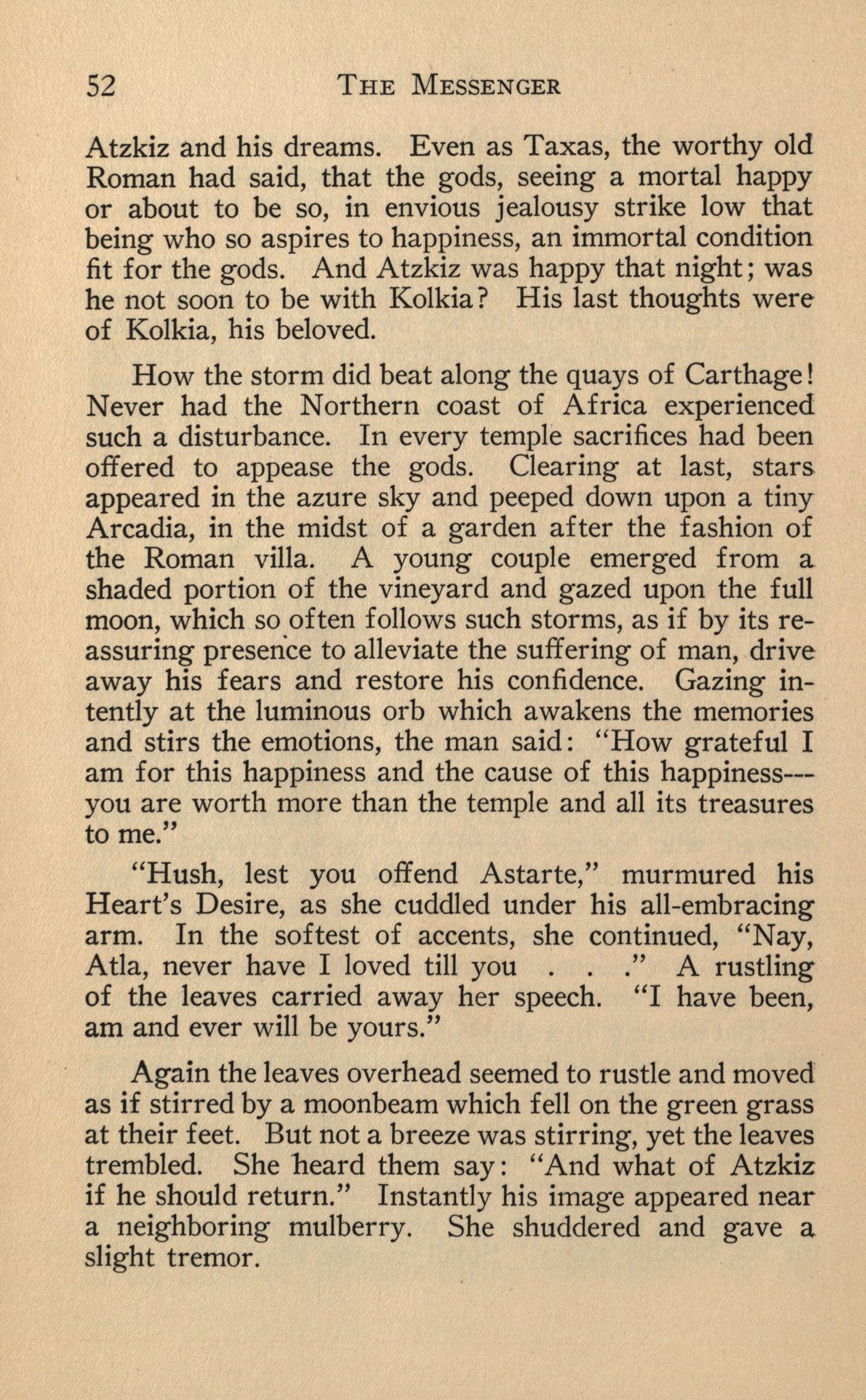
Atzkiz a.nd his dreams. Even as Taxas, the worthy old Roman had said, that the gods, seeing a mortal happy or about to be so, in envious jealousy strike low that being who so aspires to happiness, an immortal condition fit for the gods. And Atzkiz was happy that night; was he not soon to be with Kolkia? His last thoughts were of Kolkia, his beloved.
How the storm did beat along the quays of Carthage! Never had the Northern coast of Africa experienced such a disturbance. In every temple sacrifices had been offered to appease the gods. Clearing at last, stars. appeared in the azure sky and peeped down upon a tiny Arcadia, in the midst of a garden after the fashion of the Roman villa. A young couple emerged from a . shaded portion of the vineyard and gazed upon the full moon, which so of ten follows such storms, as if by its reassuring presen·ce to alleviate the suffering of man, drive away his fears and restore his confidence. Gazing intently at the luminous orb which awakens the memories and stirs the emotions, the man said: "How grateful I am for this happiness and the cause of this happiness--you are worth more than the temple and all its treasures to me."
"Hush, lest you offend Astarte," murmured his Heart's Desire, as she cuddled under his all-embracing arm. In the softest of accents, she continued, "Nay, Atla, never have I loved till you " A rustling of the leaves carried away her speech. "I have been, am and ever will be yours."
Again the leaves overhead seemed to rustle and moved as if stirred by a moonbeam which fell on the green grass at their feet. But not a breeze was stirring, yet the leaves trembled. She heard them say: "And what of Atzkiz if he should return." Instantly his image appeared near a neighboring mulberry. She shuddered and gave a. slight tremor.
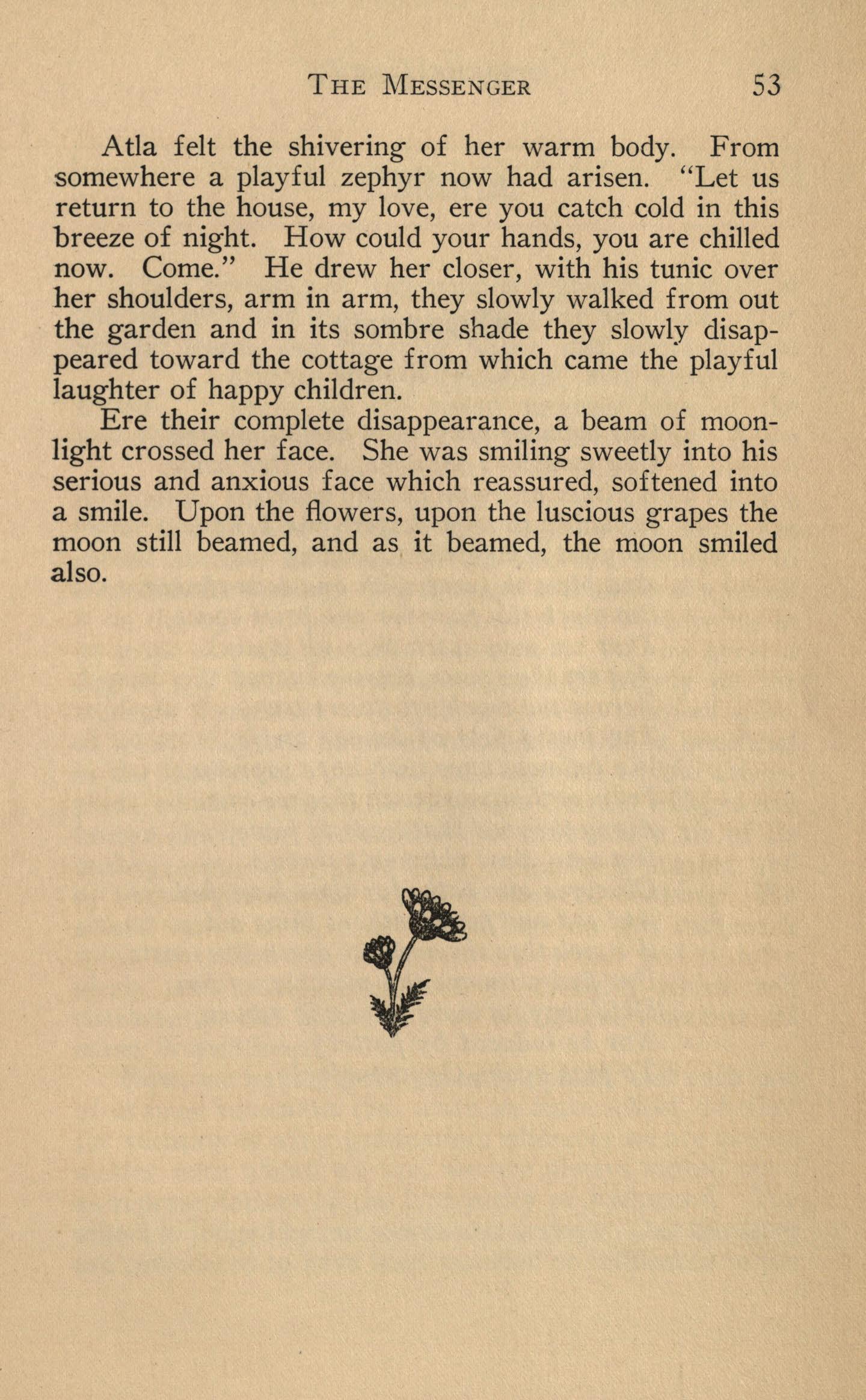
Atla felt the shivering of her warm body. From somewhere a playful zephyr now had arisen. " Let us return to the house, my love, ere you catch cold in this breeze of night. How could your hands, you are chilled now. Come." He drew her closer, with his tunic over her shoulders, arm in arm, they slowly walked from out the garden and in its sombre shade they slowly disappeared toward the cottage from which came the playful laughter of happy children.
Ere their complete disappearance, a beam of moonlight crossed her face. She was smiling sweetly into his serious and anxious face which reassured, softened into a smile. Upon the flowers, upon the luscious grapes the moon still beamed, and as it beamed, the nioon smiled also.
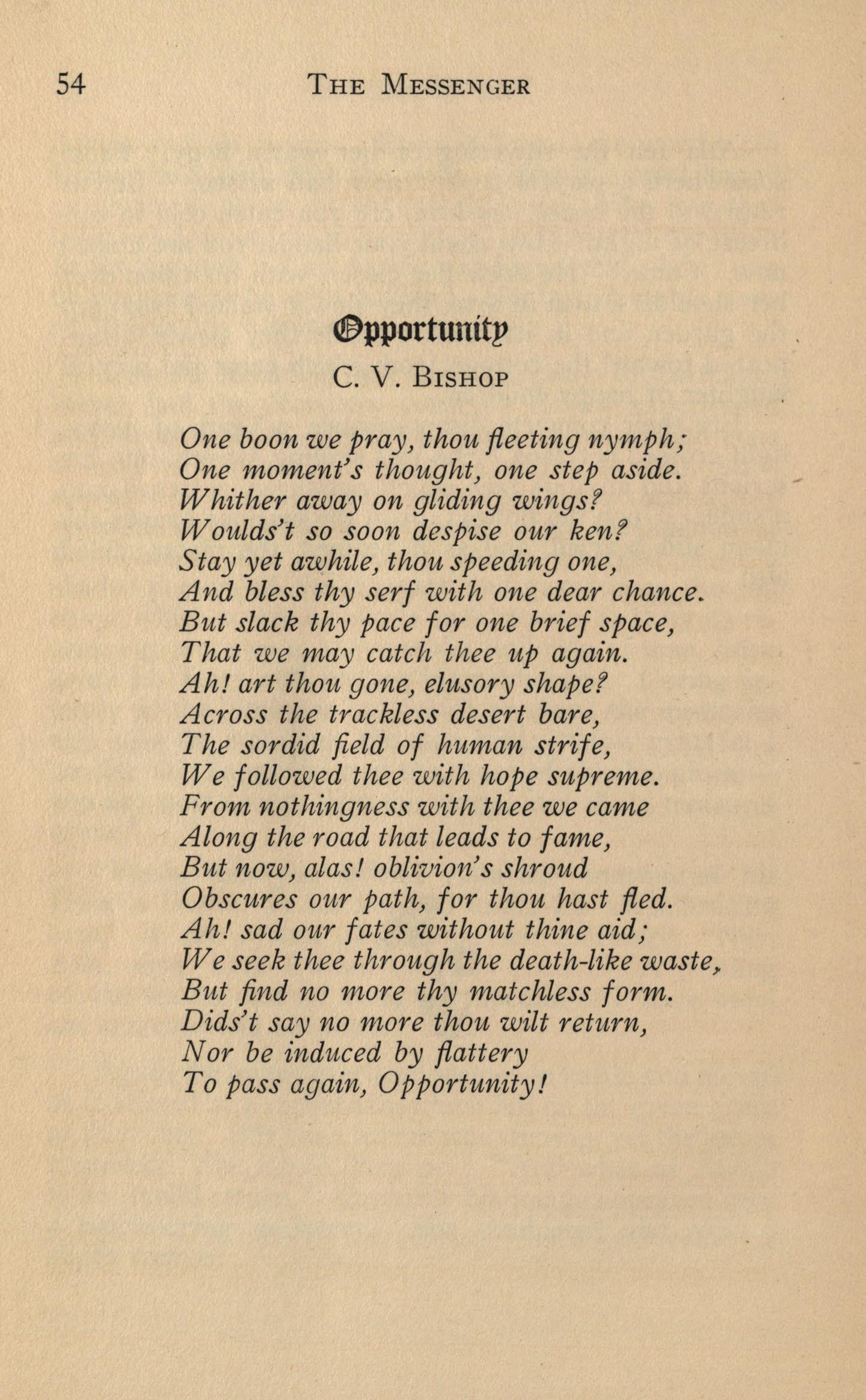
C. V. BISHOP
One boon we pray, thou fleeting nymph; One moment's thought, one step aside. Whither away on gliding wings?
W oulds't so soon despise our ken?
Stay yet awhile, thou speeding one, And bless thy serf with one dear chance. But slack thy pace for one brief space, That we may catch thee up again.
Ah! art thou gone, elusory shape? Across the trackless desert bare, The sordid field of human strife, We followed thee with hope supreme. From nothingness with thee we came Along the road that leads to fame, But now, alas! oblivion's shroud
Obscures our path, for thou hast fled.
Ah! sad our fates without thine aid; We seek thee through the death-like waste,, But find no more thy matchless farm.
Dids't say no more thou wilt return, Nor be induced by flattery
To pass again, Opportunity!
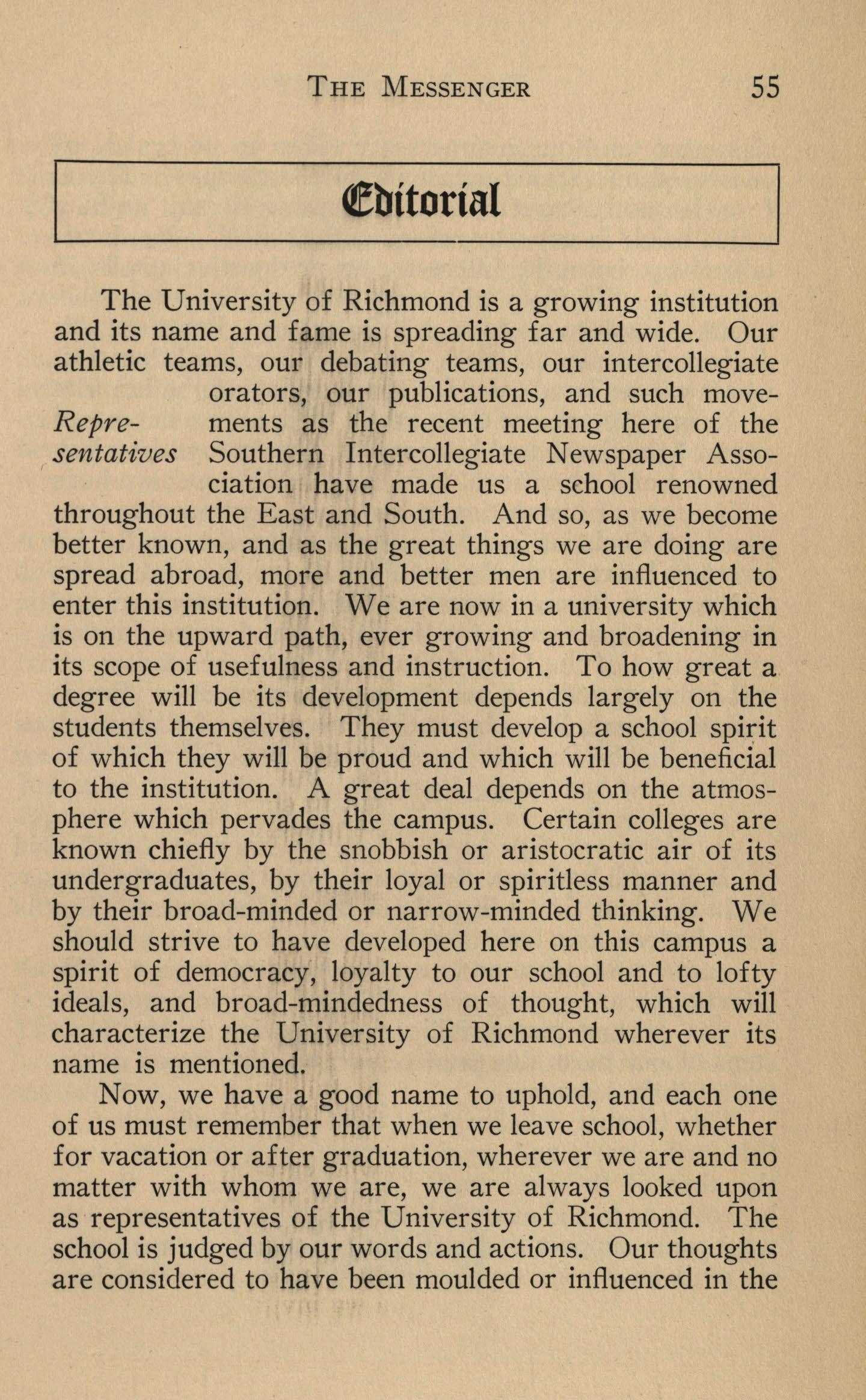
The University of Richmond is a growing institution and its name and fame is spreading far and wide. Our athletic teams, our debating teams, our intercollegiate orators, our publications, and such moveRepre- ments as the recent meeting here of the sentatives Southern Intercollegiate Newspaper Association have made us a school renowned throughout the East and South. And so, as we become better known, and as the great things we are doing are spread abroad, more and better men are influenced to enter this institution. We are now in a university which is on the upward path, ever growing and broadening in its scope of usefulness and instruction. To how great a degree will be its development depends largely on the students themselves. They must develop a school spii:-it of which they will be proud and which will be beneficial to the institution. A great deal depends on the atmosphere which pervades the campus. Certain colleges are known chiefly by the snobbish or aristocratic air of its undergraduates, by their loyal or spiritless manner and by their broad-minded or narrow-minded thinking. We should strive to have developed here on this campus a spirit of democracy, loyalty to our school and to lofty ideals, and broad-mindedness of thought, which will characterize the University of Richmond wherever its name is mentioned.
Now, we have a good name to uphold, and each one of us must remember that when we leave school, whether for vacation or after graduation, wherever we are and no matter with whom we are, we are always looked upon as representatives of the University of Richmond. The school is judged by our words and actions. Our thoughts are considered to have been moulded or influenced in the
classroom , and our manners are taken to be typical of ones used on various occasions on the campus. Therefore, let us be careful, and do nothing or say nothing which would in any way reflect on the school. We should talk it up, boost it, interest new prospective pupils in attending. Fill them with envy that you have been fortunate enough to go to such a fine place. Point out our distinct advantages; first, we have an ideal location , where we can have quiet for study, enjoying the beauties of Nature, yet we are close to one of the most important cities of the South and have access to its many historical, scientific and educational treasures; and second, we have a high type of instruction, a highly efficient faculty comp osed of Christian gentlemen ·who have the pupils' interest at heart, and who are scholars of the first order, and we can .receive degrees which are recognized and accepted at par value by the larger and more famous universities of the United States. For these reasons we can influence many a young man to enter here. So, as representativ~s , let us boost the University of Richmond.
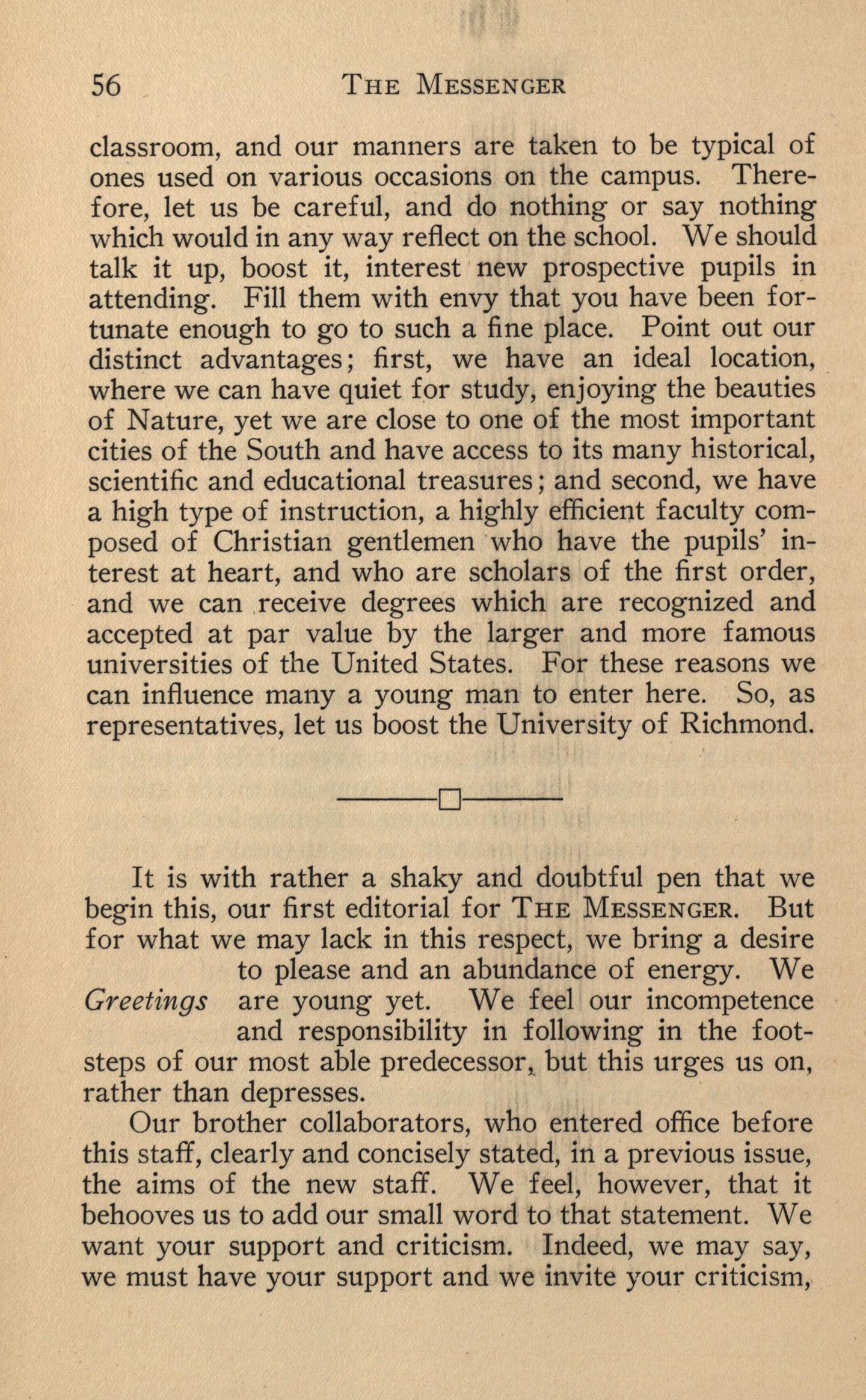
It is with rather a shaky and doubtful pen that we begin this, our first editorial for THE MESSENGER. But for what we may lack in this respect, we bring a desire to please and an abundance of energy. We Greetings are young yet. We feel our incompetence and responsibility in following in the footsteps of our most able predecessor~ but this urges us on, rather than depresses.
Our brother collaborators, who entered office before this staff, clearly and concisely stated, in a previous issue, the aims of the new staff. We feel, however, that it behooves us to add our small word to that statement. We want your support and criticism. Indeed, we may say, we must have your support and we invite your critici sm,
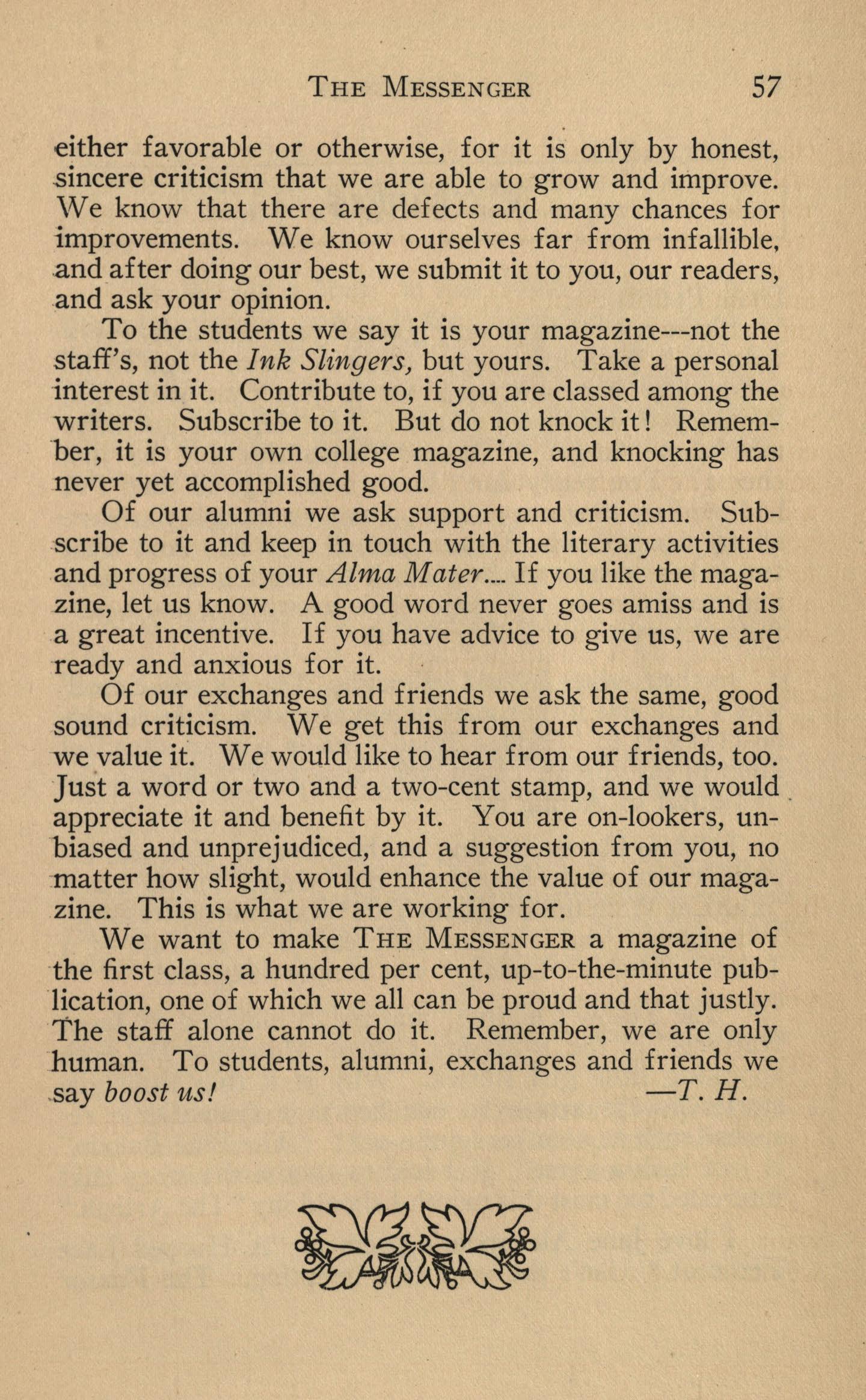
either favorable or otherwise, for it is only by honest, .sincere criticism that we are able to grow and improve. Vve know that there are defects and many chances for -improvements. We know ourselves far from infallible, .and after doing our best, we submit it to you, our readers, .and ask your opinion.
To the students we say it is your magazine---not the staff's, not the Ink Slingers, but yours. Take a personal -interest in it. Contribute to, if you are classed among the writers. Subscribe to it. But do not knock it! Remem·ber, it is your own college magazine, and knocking has never yet accomplished good.
Of our alumni we ask support and criticism. Sub.scribe to it and keep in touch with the literary activities and progress of your Alma Mater ....If you like the magazine, let us know. A good word never goes amiss and is a great incentive. If you have advice to give us, we are ready and anxious for it.
Of our exchanges and friends we ask the same, good sound criticism. We get this from our exchanges and we value it. We would like to hear from our friends, too. Just a word or two and a two-cent stamp, and we would . appreciate it and benefit by it. You are on-lookers, unbiased and unprejudiced, and a suggestion from you, no matter how slight, would enhance the value of our magazine. This is what we are working for.
We want to make THE MESSENGERa magazine of the first class, a hundred per cent, up-to-the-minute publication, one of which we all can be proud and that justly. The staff alone cannot do it. Remember, we are only human. To students, alumni, exchanges and friends we .say boost us! -T. H.

:
I have tried to be so very good all year and write every thing in a perfectly proper editorial form. You've no notion how hard it's been not to just chat with you. Would you mind very much if just this last good-byernonth, we forget all horrid formalities and be just churns? You really don't know what a good time I'vehad reading your magazines. I feel as though you were all my dear friends; I know you all so well. And what fun it has been to see how much the Spring issues have improved over the fall ones. This month I've had a per-f ectly lovely time reading you all.
In the Leslian Herald I thought "The Elusive Scent" was a delicious little romance and the poor, little, lonely-hearted girl in "Hidden Bonds" made a most dreadful lump in my throat. How very true that article on the ·"Fine Art of Acting is."
I did so like everything in the Goucher Kalends, es-pecially that clever boy story, the "Green Turtle" ·; and "The Cat With the Gingham Tale" was quite refreshing. Who cannot lend a sympathetic ear to "The Tale of a . Tub?" "Daddy's Lullaby" was simply delightful.
"The Yellow Children" and the "Childhood of Janet Harding" in the Wellesley Callege Magazine are both appealing little girl stories. Why is it that little girl stories always arouse in our hearts a sympathetic response such as no others quite can? "The Blue Baloon" is just such a verse. If I had to choose the story that interested me most this month I should say "The Artists."
I love Jane Alexander's poem to "A Hooped Lace. Petticoat." Isn't the very title tempting. The Vassar ·
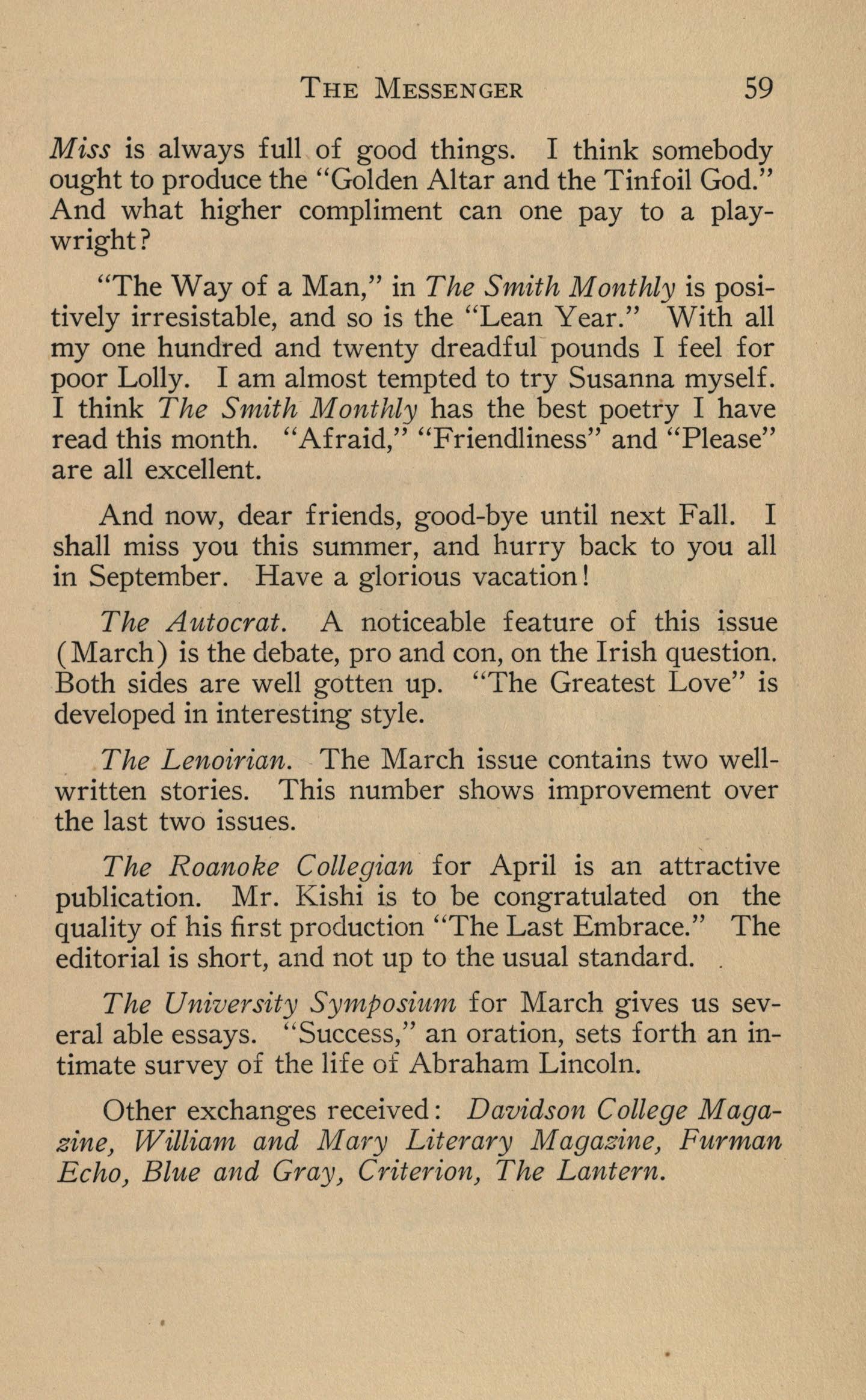
Miss is always full of good things. I think somebody ought to produce the "Golden Altar and the Tinfoil God." And what higher compliment can one pay to a playwright?
"The Way of a Man," in The Smith Monthly is positively irresistable, and so is the "Lean Year." With all my one hundred and twenty dreadful pounds I feel for poor Lolly. I am almost tempted to try Susanna myself. I think The Smith Monthly has the best poetry I have read this month. "Afraid," "Friendliness" and "Please" are all excellent.
And now, dear friends, good-bye until next Fall. I shall miss you this summer, and hurry back to you all in September. Have a glorious vacation!
The Autocrat. A noticeable feature of this issue (March) is the debate, pro and con, on the Irish question. Both sides are well gotten up. "The Greatest Love" is developed in interesting style.
The Lenoirian. The March issue contains two wellwritten stories. This number shows improvement over the last two issues.
The Roanoke Collegian for April is an attiactive publication. Mr. Kishi is to be congratulated on the quality of his first production "The Last Embrace." The editorial is short, and not up to the usual standard.
The University Symposium for March gives us several able essays. "Success," an oration, sets forth an intimate survey of the life of Abraham Lincoln.
Other exchanges received: Davidson Callege Magazine, William and Mary Literary Magazine, Furman Echo, Blue and Gray, Criterion, The Lantern.
It is now possible to have a delicious fruit punch in a few minutes time without work or worry. The unexpected guests need not worry you. The impromptu social affair may be assured success.
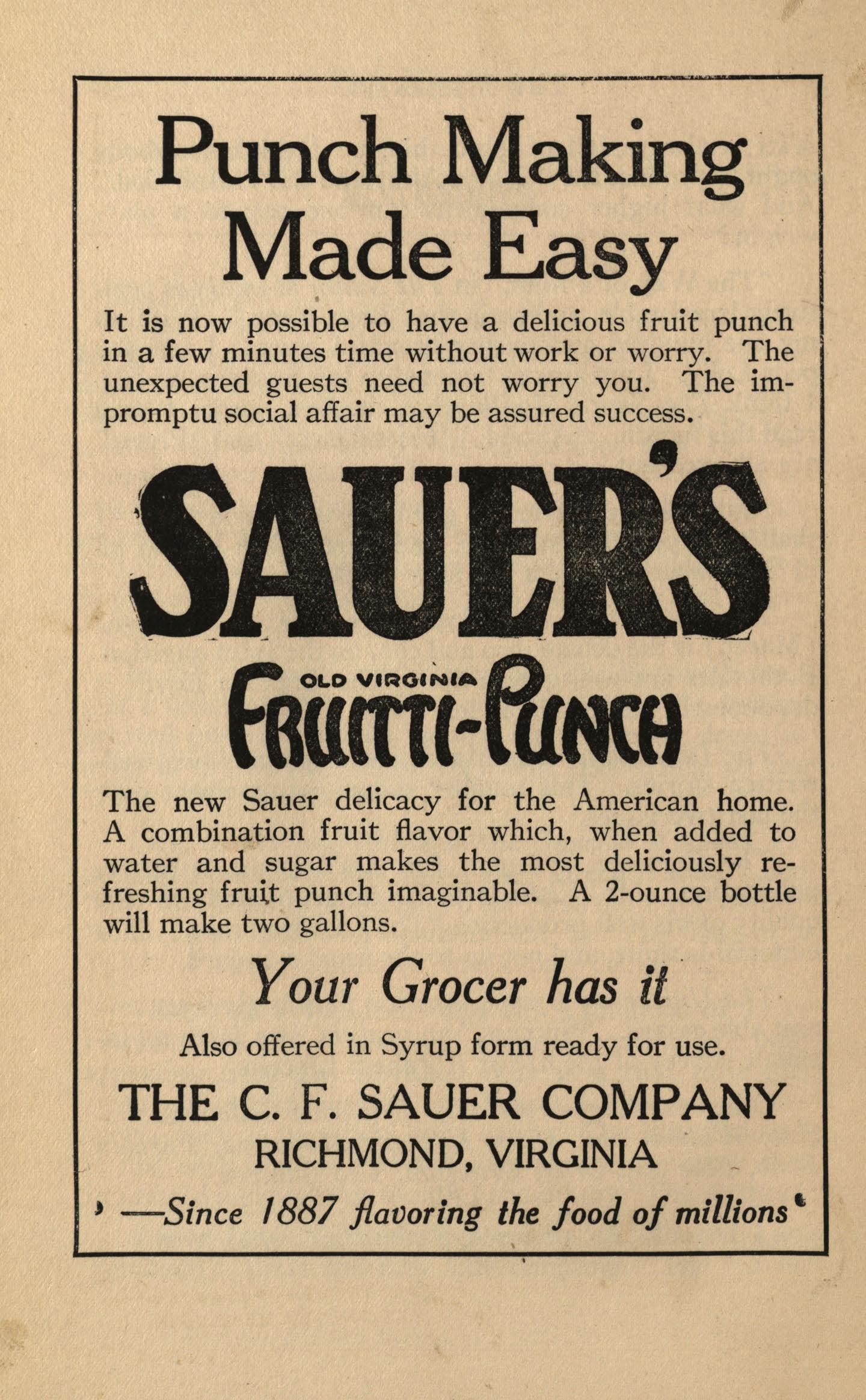
The new Sauer delicacy for the American home. A combination fruit flavor which, when added to water and sugar makes the most deliciously refreshing frui.t punch imaginable. A 2-ounce bottle will make two gallons.
Your Grocer has ii · Also offered in Syrup form ready for use. THE C. F. SAUER
RICHMOND, VIRGINIA , -Since 1887 flavoring the food of millions1